 A La Carte: Who's afraid of Romans 1? / You can only be what you can see / Are you a pastor who hurts people? / A holy life is the seed of evangelism / Thinking biblically in all areas of life / and more.]]>
A La Carte: Who's afraid of Romans 1? / You can only be what you can see / Are you a pastor who hurts people? / A holy life is the seed of evangelism / Thinking biblically in all areas of life / and more.]]>
Good morning from Austria! I very much enjoyed last weekend’s events in Schladming and am now taking a couple of rest days before heading to Romania for the final conference of this journey.
Among today’s many Kindle deals are some new titles I have read, enjoyed, and recommended like T. David Gordon’s Choose Better. There’s also a book on theological method, a biographical graphic novel, and much more.
(Yesterday on the blog: Did the Angels Laugh?)
Who’s Afraid of Romans 1?
Andy Hood has a fascinating article about Romans 1 and worldview. “The task of Christian discipleship is not to adopt a Christian worldview by putting on a particular pair of glasses but to take off our glasses and see the world as it truly is. Christianity is not a particular way of looking at the world but the truth about reality, a truth that is knowable by all.”
You Can Only Be What You Can See
T. M. Suffield takes issue with the popular idea that you can only be what you can see—that kind of intersectional thinking that says you can really only learn from people who are like you.
Are You a Pastor Who Hurts People? Six Diagnostic Questions
“I’m talking about the kind of hurt that a pastor inflicts when he acts in ways that fail to build up the body of Christ. In fact, I believe this is how most hurt happens: not when a pastor deliberately plots to make his people suffer, but when he occupies his heart with concerns and interests other than his personal relationship with Christ and the central task of caring for Christ’s flock.”
A Holy Life Is the Seed of Evangelism
Stephanie O’Donnell explains how a holy life is the seed of so much evangelism. She also tells how this proved true in her life.
Heaven on Earth
Casey McCall writes about those moments we sometimes experience when it seems like heaven breaks through to earth. “Do you ever experience those glimpses? It doesn’t have to be the changing seasons that do it for you. I get similar feelings sometimes at concerts. Sometimes it comes over me during mundane family dinners with my wife and children when an unforeseen cheeriness pervades the room. Most often, I experience it at church—as the diverse voices of Christ’s redeemed people sing in unison about the glory of Christ or when a testimony leads me to taste grace more deeply. I can’t manufacture these experiences.”
Thinking Biblically in All Areas of Life
“In a world flooded with persuasive voices, we must learn to think biblically in every corner of our lives.” Doug explains how and why.
Flashback: The Bit of Heaven the Heaven Tourism Books Never Touched
The heaven tourism books, written by men and women still stained by sin, couldn’t show us the glory of that sinless world.
]]> Happy 4th of July to my American friends and family! Because this week has holidays for both Canada and the US, I am posting A La Carte only through to Friday. I’ve got some good articles queued up for next week! As I mentioned last week, with 2023 already half over, I thought I’d put together a list of my top books from 2023 (so far). 10ofThose is offering a 40% discount on all of them. Use coupon code 40CHALLIES23. My Journey Out of Mormonism Zach Carter, who descended from Mormon “royalty,” tells how he came to know the true Jesus. Should Christians Sue Each Other? (1 Corinthians 6) The article discusses Paul’s argument in 1 Corinthians 6 that legal disputes between believers should be settled before believers rather than before non-believers. Are you tired of celebrity pastors? “In an era of celebrity pastors… Thomas Boston is like a spiritual polestar to guide us by a better way to a better destiny. The Complete Works of Thomas Boston are a spiritual treasure trove waiting to be opened.” —Sinclair B. Ferguson, author of The Whole Christ. (Sponsored Link) What Is New Age Spirituality? This article from Ligonier Ministries breaks down New Age spirituality. “New Age spirituality is an umbrella term that describes a contemporary religious movement, not an organized religion. Proponents of the movement encourage striving to reach one’s full potential through an eclectic mixture of concepts and practices drawn from Eastern mysticism, Hinduism, Buddhism, metaphysics, naturalism, astrology, occultism, and science fiction.” Jonathan Edwards Was Fired…]]>
Happy 4th of July to my American friends and family! Because this week has holidays for both Canada and the US, I am posting A La Carte only through to Friday. I’ve got some good articles queued up for next week! As I mentioned last week, with 2023 already half over, I thought I’d put together a list of my top books from 2023 (so far). 10ofThose is offering a 40% discount on all of them. Use coupon code 40CHALLIES23. My Journey Out of Mormonism Zach Carter, who descended from Mormon “royalty,” tells how he came to know the true Jesus. Should Christians Sue Each Other? (1 Corinthians 6) The article discusses Paul’s argument in 1 Corinthians 6 that legal disputes between believers should be settled before believers rather than before non-believers. Are you tired of celebrity pastors? “In an era of celebrity pastors… Thomas Boston is like a spiritual polestar to guide us by a better way to a better destiny. The Complete Works of Thomas Boston are a spiritual treasure trove waiting to be opened.” —Sinclair B. Ferguson, author of The Whole Christ. (Sponsored Link) What Is New Age Spirituality? This article from Ligonier Ministries breaks down New Age spirituality. “New Age spirituality is an umbrella term that describes a contemporary religious movement, not an organized religion. Proponents of the movement encourage striving to reach one’s full potential through an eclectic mixture of concepts and practices drawn from Eastern mysticism, Hinduism, Buddhism, metaphysics, naturalism, astrology, occultism, and science fiction.” Jonathan Edwards Was Fired…]]>
Happy 4th of July to my American friends and family! Because this week has holidays for both Canada and the US, I am posting A La Carte only through to Friday. I’ve got some good articles queued up for next week!
As I mentioned last week, with 2023 already half over, I thought I’d put together a list of my top books from 2023 (so far). 10ofThose is offering a 40% discount on all of them. Use coupon code 40CHALLIES23.
My Journey Out of Mormonism
Zach Carter, who descended from Mormon “royalty,” tells how he came to know the true Jesus.
Should Christians Sue Each Other? (1 Corinthians 6)
The article discusses Paul’s argument in 1 Corinthians 6 that legal disputes between believers should be settled before believers rather than before non-believers.
Are you tired of celebrity pastors?
“In an era of celebrity pastors… Thomas Boston is like a spiritual polestar to guide us by a better way to a better destiny. The Complete Works of Thomas Boston are a spiritual treasure trove waiting to be opened.” —Sinclair B. Ferguson, author of The Whole Christ. (Sponsored Link)
What Is New Age Spirituality?
This article from Ligonier Ministries breaks down New Age spirituality. “New Age spirituality is an umbrella term that describes a contemporary religious movement, not an organized religion. Proponents of the movement encourage striving to reach one’s full potential through an eclectic mixture of concepts and practices drawn from Eastern mysticism, Hinduism, Buddhism, metaphysics, naturalism, astrology, occultism, and science fiction.”
Jonathan Edwards Was Fired
“Jonathan Edwards was unequivocally the greatest mind of Colonial America. He was arguably one of the greatest minds America has ever produced.” He also once got unceremoniously fired. Joe Holland considers what happened and why.
When Sin Runs Deep, Our Patience Should Run Deeper Still
“The sin we see at the surface often isn’t the original sin that led to the behavior we see. Romans 1 tells us that it begins with ingratitude towards God as our Creator which then becomes a slow darkening of our minds to God’s obvious commands, presence, and existence. As we turn our faces away from God and blindfold ourselves to him, our hearts grow harder and sin births more sins.”
Living in Light of the Second Coming of Jesus
Aaron Armstrong offers some ways we can live in light of Christ’s second coming.
Flashback: A Parent’s Prayer for an Unbelieving Child
“But now I stop to pray again, and I will pray again, O Lord of life: please shine the light of Jesus in his heart, that my child may believe.”
]]> This week’s Free Stuff Friday is sponsored by The Good Book Company. They have five book bundles for giveaway, featuring titles to encourage you that the Gospel is Good News for everyone. The giveaway will close on March 24th at noon EST. Is God Anti-Gay?(Expanded and Updated) by Sam Allberry Author and speaker Sam Allberry has expanded and restructured his best-selling book, which draws on his own experience as a believer who experiences same-sex attraction. As well as exploring Bible passages that talk directly about homosexuality, this new edition frames the whole discussion with Jesus’ general teaching on sex and marriage, as well as what Jesus teaches about finding ultimate satisfaction and happiness. It also challenges the current culture narrative, which inextricably ties sexuality to personal identity, and he shows that the gospel is good news for everyone, whatever their sexual orientation. This sensitive exploration of the Bible’s teaching on sexuality has been written to help both Christians and non-Christians struggling with the Bible’s teaching on this issue, whether they experience same-sex attraction themselves or not. Essential Christianity by J.D. Greear Drawing on passages from Romans 1 to 12, J.D. Greear unpacks the essential aspects of the Christian message, showing both secular and religious people what the gospel is and how it addresses our most pertinent questions. The gospel, as he explains, is not just about life after death; it’s about reclaiming the life we’ve always yearned to live. Whether you are exploring the core concepts of Christianity or you are a weary Christian wanting…]]>
This week’s Free Stuff Friday is sponsored by The Good Book Company. They have five book bundles for giveaway, featuring titles to encourage you that the Gospel is Good News for everyone. The giveaway will close on March 24th at noon EST. Is God Anti-Gay?(Expanded and Updated) by Sam Allberry Author and speaker Sam Allberry has expanded and restructured his best-selling book, which draws on his own experience as a believer who experiences same-sex attraction. As well as exploring Bible passages that talk directly about homosexuality, this new edition frames the whole discussion with Jesus’ general teaching on sex and marriage, as well as what Jesus teaches about finding ultimate satisfaction and happiness. It also challenges the current culture narrative, which inextricably ties sexuality to personal identity, and he shows that the gospel is good news for everyone, whatever their sexual orientation. This sensitive exploration of the Bible’s teaching on sexuality has been written to help both Christians and non-Christians struggling with the Bible’s teaching on this issue, whether they experience same-sex attraction themselves or not. Essential Christianity by J.D. Greear Drawing on passages from Romans 1 to 12, J.D. Greear unpacks the essential aspects of the Christian message, showing both secular and religious people what the gospel is and how it addresses our most pertinent questions. The gospel, as he explains, is not just about life after death; it’s about reclaiming the life we’ve always yearned to live. Whether you are exploring the core concepts of Christianity or you are a weary Christian wanting…]]>
This week’s Free Stuff Friday is sponsored by The Good Book Company. They have five book bundles for giveaway, featuring titles to encourage you that the Gospel is Good News for everyone. The giveaway will close on March 24th at noon EST.
Is God Anti-Gay?(Expanded and Updated) by Sam Allberry
Author and speaker Sam Allberry has expanded and restructured his best-selling book, which draws on his own experience as a believer who experiences same-sex attraction. As well as exploring Bible passages that talk directly about homosexuality, this new edition frames the whole discussion with Jesus’ general teaching on sex and marriage, as well as what Jesus teaches about finding ultimate satisfaction and happiness. It also challenges the current culture narrative, which inextricably ties sexuality to personal identity, and he shows that the gospel is good news for everyone, whatever their sexual orientation.
This sensitive exploration of the Bible’s teaching on sexuality has been written to help both Christians and non-Christians struggling with the Bible’s teaching on this issue, whether they experience same-sex attraction themselves or not.
Essential Christianity by J.D. Greear
Drawing on passages from Romans 1 to 12, J.D. Greear unpacks the essential aspects of the Christian message, showing both secular and religious people what the gospel is and how it addresses our most pertinent questions. The gospel, as he explains, is not just about life after death; it’s about reclaiming the life we’ve always yearned to live.
Whether you are exploring the core concepts of Christianity or you are a weary Christian wanting to rediscover the excitement and joy of knowing God, this warm and compelling explanation of the goodness, truth, and power at the heart of the Christian faith is for you.
This resource can be used for outreach or discipleship and is great to read with other people. It can also be used alongside J.D.’s Romans video series on RightNow Media.
Life with Jesus by Tim Chester
What does Christian discipleship look like in practice? This 12-session discipleship course, perfect for individuals or groups, looks at how the gospel and God’s grace can shape our attitude towards church, Bible reading, prayer, suffering, how to use our money and many other aspects of life.
Incorporating Bible study, clear explanations and thought-provoking discussion questions, these sessions can be completed in around an hour and are designed to be used flexibly in different contexts: individually, in small groups, or one-to-one. Includes plenty of material to engage mature Christians as well as new believers, and an emphasis on practical, real-life application to help people follow Jesus in every area of their lives.
Is Easter Unbelievable? by Rebecca McLaughlin
The resurrection of Jesus from the dead is an extraordinary thing to believe. Such a supernatural event is the stuff of make-believe, many think. Yet millions of Christians around the world believe that Jesus’ resurrection was a real, historical event. Indeed, “if Christ has not been raised, our preaching is useless and so is your faith” and Christians are “of all people most to be pitied.” (1 Corinthians 15)
In this concise book, respected apologist Rebecca McLaughlin outlines the evidence that Jesus really did rise from the dead and why it’s the best news ever. Ideal to give away at Easter outreach services and events, as well as to give to new Christians wanting to remind themselves of the evidence for their faith.
God’s Very Good Idea Board Book
Using simple sentences and stunning illustrations, this board book shows toddlers that they are made by God to be the people they are. And it teaches them that God made everyone to be different (different sexes, skin colors, and interests), but he values all of us equally as people made in his image.
This foundational book on value and diversity makes a perfect gift for toddlers. (The corresponding storybook for 3-6-year-olds expand on these truths, adding more detail, explanation, and context.)
Again, there are five packages to win. And all you need to do to enter the draw is to drop your name and email address in the form below.
Giveaway Rules: You may enter one time. When you enter, you permit The Good Book Company to send you marketing emails. The winners will be notified via email, and those who do not win will receive an email with the option to download a free e-copy of Is Easter Unbelievable?. The giveaway closes on Friday, March 24th at noon EST.
]]> Grace and peace to you today. Today’s Kindle deals include quite a nice little selection. Westminster Books has a great deal on a new study Bible that looks quite interesting: The ESV Church History Study Bible. (Yesterday on the blog: What I Long for More than Miracles) One Hope for Our Mass Derangement I recently commended Alistair Begg’s series on Romans 1 and biblical sexuality. He’s got an article on it at TGC that is drawn from that series and well worth reading. God or Money: Detangling a Complicated Relationship “Christians have a complicated relationship with money and gospel ministry.” Renee Zou provides some help detangling it in this article. Putting the Mess in Christmess “The history surrounding Christmas has been anything but peace on earth and goodwill toward men. While contemporary religious and cultural traditions may evoke a certain nostalgia for its celebration, its history is actually a mess! One big mess — with feverish disagreements, hostility, and even rioting.” You Don’t Need to Apologize for Crying “It isn’t uncommon for people to apologize for crying during a meeting. Why do you think this is the case? While it could be for a variety of reasons, two are especially prevalent.” Hope > Optimism Seth explains why hope beats optimism. “I’ve always been an optimist. I’ve got so much optimism I can be an optimist for you as well, if you want me to. I can believe all the best things about your future and mine. It comes naturally for me, so it’s no trouble.…]]>
Grace and peace to you today. Today’s Kindle deals include quite a nice little selection. Westminster Books has a great deal on a new study Bible that looks quite interesting: The ESV Church History Study Bible. (Yesterday on the blog: What I Long for More than Miracles) One Hope for Our Mass Derangement I recently commended Alistair Begg’s series on Romans 1 and biblical sexuality. He’s got an article on it at TGC that is drawn from that series and well worth reading. God or Money: Detangling a Complicated Relationship “Christians have a complicated relationship with money and gospel ministry.” Renee Zou provides some help detangling it in this article. Putting the Mess in Christmess “The history surrounding Christmas has been anything but peace on earth and goodwill toward men. While contemporary religious and cultural traditions may evoke a certain nostalgia for its celebration, its history is actually a mess! One big mess — with feverish disagreements, hostility, and even rioting.” You Don’t Need to Apologize for Crying “It isn’t uncommon for people to apologize for crying during a meeting. Why do you think this is the case? While it could be for a variety of reasons, two are especially prevalent.” Hope > Optimism Seth explains why hope beats optimism. “I’ve always been an optimist. I’ve got so much optimism I can be an optimist for you as well, if you want me to. I can believe all the best things about your future and mine. It comes naturally for me, so it’s no trouble.…]]>
Grace and peace to you today.
Today’s Kindle deals include quite a nice little selection.
Westminster Books has a great deal on a new study Bible that looks quite interesting: The ESV Church History Study Bible.
(Yesterday on the blog: What I Long for More than Miracles)
One Hope for Our Mass Derangement
I recently commended Alistair Begg’s series on Romans 1 and biblical sexuality. He’s got an article on it at TGC that is drawn from that series and well worth reading.
God or Money: Detangling a Complicated Relationship
“Christians have a complicated relationship with money and gospel ministry.” Renee Zou provides some help detangling it in this article.
Putting the Mess in Christmess
“The history surrounding Christmas has been anything but peace on earth and goodwill toward men. While contemporary religious and cultural traditions may evoke a certain nostalgia for its celebration, its history is actually a mess! One big mess — with feverish disagreements, hostility, and even rioting.”
You Don’t Need to Apologize for Crying
“It isn’t uncommon for people to apologize for crying during a meeting. Why do you think this is the case? While it could be for a variety of reasons, two are especially prevalent.”
Hope > Optimism
Seth explains why hope beats optimism. “I’ve always been an optimist. I’ve got so much optimism I can be an optimist for you as well, if you want me to. I can believe all the best things about your future and mine. It comes naturally for me, so it’s no trouble. The only trouble with the whole thing is the trouble that keeps popping up and spoiling my optimistic outlooks. Sometimes everything doesn’t work out. Sometimes it’s not ok. Sometimes it’s not grand, it’s not good, and it’s not even fine.”
Broken Angels
Donna reflects on some of what she’s thinking and feeling as she approaches her first Christmas without her son.
Flashback: He Gives His Beloved Sleep
Of all the divine thoughts recorded in the pages of sacred writ, of all the promises God provides to humanity, perhaps none is more moving, none more blessed, none more needful than this: He gives his beloved sleep.
]]> Good morning. Grace and peace to you. Today’s Kindle deals include some good picks from Jen Wilkin. (Yesterday on the blog: We Do Not Know Until…) My Anchor Holds “Waves crashed against the steel hull. Winds whipped around as the frame of the ship lurched back and forth. A rusty chain stretched from the aft side of the vessel and disappeared below the foaming waters. Yet as the rain pelted through the treacherous night—the anchor held.” It’s a Wonderful Telescope (Video) This video from the John 10:10 Project combines astronomy, Scripture, and It’s a Wonderful Life. God Does Not Forget Prayers or Promises Barbara Harper has a sweet devotional about prayers and promises. Alistair Begg on Romans 1 Alistair Begg has been preaching through Romans 1 and I am finding it tremendously beneficial. I highly recommend it. You can watch it, listen to it, or read it at the link. Stay Awake! “What is the action we are looking for that requires us to steer clear of bedclothes and keep the energy bills high? What are we being charged to do? What is required of us in this text? Such questions deserve our mental energy. So, take a minute to open your Bible to Luke 12:35-40 and ask yourself, “What is the action for which I am to be prepared?” What is the thing I must do?” Five Truths You Must Consider When You Are Angry I’d probably suggest you should consider these five truths before you are angry (so you have them available when…]]>
Good morning. Grace and peace to you. Today’s Kindle deals include some good picks from Jen Wilkin. (Yesterday on the blog: We Do Not Know Until…) My Anchor Holds “Waves crashed against the steel hull. Winds whipped around as the frame of the ship lurched back and forth. A rusty chain stretched from the aft side of the vessel and disappeared below the foaming waters. Yet as the rain pelted through the treacherous night—the anchor held.” It’s a Wonderful Telescope (Video) This video from the John 10:10 Project combines astronomy, Scripture, and It’s a Wonderful Life. God Does Not Forget Prayers or Promises Barbara Harper has a sweet devotional about prayers and promises. Alistair Begg on Romans 1 Alistair Begg has been preaching through Romans 1 and I am finding it tremendously beneficial. I highly recommend it. You can watch it, listen to it, or read it at the link. Stay Awake! “What is the action we are looking for that requires us to steer clear of bedclothes and keep the energy bills high? What are we being charged to do? What is required of us in this text? Such questions deserve our mental energy. So, take a minute to open your Bible to Luke 12:35-40 and ask yourself, “What is the action for which I am to be prepared?” What is the thing I must do?” Five Truths You Must Consider When You Are Angry I’d probably suggest you should consider these five truths before you are angry (so you have them available when…]]>
Good morning. Grace and peace to you.
Today’s Kindle deals include some good picks from Jen Wilkin.
(Yesterday on the blog: We Do Not Know Until…)
My Anchor Holds
“Waves crashed against the steel hull. Winds whipped around as the frame of the ship lurched back and forth. A rusty chain stretched from the aft side of the vessel and disappeared below the foaming waters. Yet as the rain pelted through the treacherous night—the anchor held.”
It’s a Wonderful Telescope (Video)
This video from the John 10:10 Project combines astronomy, Scripture, and It’s a Wonderful Life.
God Does Not Forget Prayers or Promises
Barbara Harper has a sweet devotional about prayers and promises.
Alistair Begg on Romans 1
Alistair Begg has been preaching through Romans 1 and I am finding it tremendously beneficial. I highly recommend it. You can watch it, listen to it, or read it at the link.
Stay Awake!
“What is the action we are looking for that requires us to steer clear of bedclothes and keep the energy bills high? What are we being charged to do? What is required of us in this text? Such questions deserve our mental energy. So, take a minute to open your Bible to Luke 12:35-40 and ask yourself, “What is the action for which I am to be prepared?” What is the thing I must do?”
Five Truths You Must Consider When You Are Angry
I’d probably suggest you should consider these five truths before you are angry (so you have them available when you’re actually angry).
Flashback: Do Not Be Surprised if the World Hates You
My friend, the more you love and honor God, the more you expose the evil of those who do not. The more you expose the evil of those who dishonor God, the more they’ll hate you. They’ll hate you because of who you love, because of who you resemble. They hated Jesus and they’ll hate those who are like Jesus.
]]> Grace and peace to you! I scoured the Internet yesterday, as I usually do, and found some links I thought you’d enjoy. Here they are… (Yesterday on the blog: Grownups Aren’t Afraid of Shadows) An Interview with Paul on What’s Wrong with Us Justin Taylor looks to Romans 1 to put together an interview with the Apostle Paul. God Saves to Make Much of Himself — Doesn’t That Lessen His Love? John Piper: “God’s love for you, which makes much of you for his glory, is a greater love for you than if he ended by making much of you. If he just made much of you as your greatest treasure rather than him as your greatest treasure, if he did everything he could do to help you feel like a treasure rather than helping you feel like he’s the greatest treasure, he would not love you so much.” Does John’s Last Supper Chronology Differ from the Other Gospels? So why does John’s chronology of the Last Supper differ from the accounts of the other gospels? This article answers. Persistence in Unanswered Prayer Prayer is a great privilege of the Christian, yet it also “presents some of the greatest challenges for the believer, especially the challenge of many seemingly unanswered prayers. Thus faithful Christians often wonder, Why isn’t God answering me? Why does it seem like my prayers are hitting the ceiling and bouncing back down to me? Is there a sin in my life that I am unaware of and could that be the…]]>
Grace and peace to you! I scoured the Internet yesterday, as I usually do, and found some links I thought you’d enjoy. Here they are… (Yesterday on the blog: Grownups Aren’t Afraid of Shadows) An Interview with Paul on What’s Wrong with Us Justin Taylor looks to Romans 1 to put together an interview with the Apostle Paul. God Saves to Make Much of Himself — Doesn’t That Lessen His Love? John Piper: “God’s love for you, which makes much of you for his glory, is a greater love for you than if he ended by making much of you. If he just made much of you as your greatest treasure rather than him as your greatest treasure, if he did everything he could do to help you feel like a treasure rather than helping you feel like he’s the greatest treasure, he would not love you so much.” Does John’s Last Supper Chronology Differ from the Other Gospels? So why does John’s chronology of the Last Supper differ from the accounts of the other gospels? This article answers. Persistence in Unanswered Prayer Prayer is a great privilege of the Christian, yet it also “presents some of the greatest challenges for the believer, especially the challenge of many seemingly unanswered prayers. Thus faithful Christians often wonder, Why isn’t God answering me? Why does it seem like my prayers are hitting the ceiling and bouncing back down to me? Is there a sin in my life that I am unaware of and could that be the…]]>
Grace and peace to you!
I scoured the Internet yesterday, as I usually do, and found some links I thought you’d enjoy. Here they are…
(Yesterday on the blog: Grownups Aren’t Afraid of Shadows)
An Interview with Paul on What’s Wrong with Us
Justin Taylor looks to Romans 1 to put together an interview with the Apostle Paul.
God Saves to Make Much of Himself — Doesn’t That Lessen His Love?
John Piper: “God’s love for you, which makes much of you for his glory, is a greater love for you than if he ended by making much of you. If he just made much of you as your greatest treasure rather than him as your greatest treasure, if he did everything he could do to help you feel like a treasure rather than helping you feel like he’s the greatest treasure, he would not love you so much.”
Does John’s Last Supper Chronology Differ from the Other Gospels?
So why does John’s chronology of the Last Supper differ from the accounts of the other gospels? This article answers.
Persistence in Unanswered Prayer
Prayer is a great privilege of the Christian, yet it also “presents some of the greatest challenges for the believer, especially the challenge of many seemingly unanswered prayers. Thus faithful Christians often wonder, Why isn’t God answering me? Why does it seem like my prayers are hitting the ceiling and bouncing back down to me? Is there a sin in my life that I am unaware of and could that be the reason God is withholding an answer?”
Growing Up To Be Mom
“Little hands on mighty hips, my seven-year-old face-offed with her teacher. The innocent question, ‘What do you want to be when you grow up?’ torched the classroom. It seems out of the entire class only my daughter thought the response, ‘I want to be a Mom,’ worth defending. Like a ninja warrior.”
To Do: Look Up and Rejoice!
I really enjoyed this one from TGC Australia: “As I drove down my street, I was surprised to see a bunch of what looked like pre-schoolers—kids aged around 3 to 4—lying on the ground, looking up at a tree on the nature strip outside my house. I very carefully pulled into my driveway, turned my car off and jumped out, blurting out ‘is everything ok?’ rather loudly.”
Flashback: We Always Glean Among the Sheaves
In our most difficult times, God gives us abundant promises to claim, abundant mercy to appeal for, abundant grace to sustain us. His Word is full of hope, full of light, full of life.
]]> I want to remind you of my new site SquareQuotes where you can find quote graphics on a wide variety of subjects. They are all free for the downloading… It is another pretty good day for Kindle deals and they include several titles by Wiersbe on key books of the Bible. The Ministry Goal No One Talks About This is a good one! “What happened May 31 is not only something I’ll probably never see again, it’s a ministry goal almost no one talks about. However, having occupied a front–row seat for the past 13 years of this accomplishment, I’d like to examine both the labor and the fruit…” Evangelicals Hold Steady on Doctrine, More Outspoken on Politics Yesterday I linked to the new State of Theology survey. Here’s an article on it by Christianity and another one by Facts & Trends. Thinking Critically about Critical Race Theory Stand to Reason has a good, short look at Critical Race Theory, and an explanation as to why its incompatible with Christianity. Does God Single Out the Sin of Homosexuality? (Romans 1) Why in Romans 1 does Paul single out the sin of homosexuality? This article explains. What Is The Best Method Of Apologetics? (Video) This may not be exactly the answer some people will be looking for, but it’s still a good one. This Isn’t The Mountain Top You Were Looking For “It struck me in church on Sunday, standing 2 metres away from my friends, humming into my face mask, that this what what you…]]>
I want to remind you of my new site SquareQuotes where you can find quote graphics on a wide variety of subjects. They are all free for the downloading… It is another pretty good day for Kindle deals and they include several titles by Wiersbe on key books of the Bible. The Ministry Goal No One Talks About This is a good one! “What happened May 31 is not only something I’ll probably never see again, it’s a ministry goal almost no one talks about. However, having occupied a front–row seat for the past 13 years of this accomplishment, I’d like to examine both the labor and the fruit…” Evangelicals Hold Steady on Doctrine, More Outspoken on Politics Yesterday I linked to the new State of Theology survey. Here’s an article on it by Christianity and another one by Facts & Trends. Thinking Critically about Critical Race Theory Stand to Reason has a good, short look at Critical Race Theory, and an explanation as to why its incompatible with Christianity. Does God Single Out the Sin of Homosexuality? (Romans 1) Why in Romans 1 does Paul single out the sin of homosexuality? This article explains. What Is The Best Method Of Apologetics? (Video) This may not be exactly the answer some people will be looking for, but it’s still a good one. This Isn’t The Mountain Top You Were Looking For “It struck me in church on Sunday, standing 2 metres away from my friends, humming into my face mask, that this what what you…]]>
I want to remind you of my new site SquareQuotes where you can find quote graphics on a wide variety of subjects. They are all free for the downloading…
It is another pretty good day for Kindle deals and they include several titles by Wiersbe on key books of the Bible.
The Ministry Goal No One Talks About
This is a good one! “What happened May 31 is not only something I’ll probably never see again, it’s a ministry goal almost no one talks about. However, having occupied a front–row seat for the past 13 years of this accomplishment, I’d like to examine both the labor and the fruit…”
Evangelicals Hold Steady on Doctrine, More Outspoken on Politics
Yesterday I linked to the new State of Theology survey. Here’s an article on it by Christianity and another one by Facts & Trends.
Thinking Critically about Critical Race Theory
Stand to Reason has a good, short look at Critical Race Theory, and an explanation as to why its incompatible with Christianity.
Does God Single Out the Sin of Homosexuality? (Romans 1)
Why in Romans 1 does Paul single out the sin of homosexuality? This article explains.
What Is The Best Method Of Apologetics? (Video)
This may not be exactly the answer some people will be looking for, but it’s still a good one.
This Isn’t The Mountain Top You Were Looking For
“It struck me in church on Sunday, standing 2 metres away from my friends, humming into my face mask, that this what what you might call a mountain-top experience. OK, it’s not exactly what one usually means when one thinks of mountain-top experiences…”
Seeking the Lost
This article is meant to help you rejoice as you consider what God does when he seeks the lost.
Flashback: The Greatest Wall
The barrier fell, and it fell forever. It took with it all of the hostility that had made it necessary. God and man could now, at last, be reunited.
]]> Yesterday was a happy day as we got the news from Louisville that my son asked his girl to marry him, and she said yes. What joy! Today’s Kindle deals include the usual Saturday classics plus a few newer works (e.g. two of the volumes of the NSBT). (Yesterday on the blog: The Place To Begin When Learning About Social Justice) Inerrancy and Evangelicals: The Challenge for a New Generation I really enjoyed this long look at the history and future of the doctrine of inerrancy. The Image of God and the Wonder of Language I love language and languages. “Human language is a stunning mystery. There are over 6,000 surviving languages in the world. Yet not one of these natural languages emerged through a process of careful planning and human creation. They simply emerged in an act of collective unconscious (re)creation, complete with complex rules of grammar and diverse and nuanced vocabulary. How in the world did that happen without any planning?” A Reprobate Mind (Video) What does it mean in Romans 1 that God gave people up to a reprobate mind? Derek Thomas answers. Photoreal Roman Emperor Project Having read a fair bit about Rome and its rulers, I rather enjoyed this project which tries to put photorealistic faces on the different Emperors. Five Ways God’s Anger is Not Like Ours Colin Smith lays out some ways that God’s anger is not like our anger. “The words ‘anger’ and ‘wrath’ make us think about our own experience of these things. You may have…]]>
Yesterday was a happy day as we got the news from Louisville that my son asked his girl to marry him, and she said yes. What joy! Today’s Kindle deals include the usual Saturday classics plus a few newer works (e.g. two of the volumes of the NSBT). (Yesterday on the blog: The Place To Begin When Learning About Social Justice) Inerrancy and Evangelicals: The Challenge for a New Generation I really enjoyed this long look at the history and future of the doctrine of inerrancy. The Image of God and the Wonder of Language I love language and languages. “Human language is a stunning mystery. There are over 6,000 surviving languages in the world. Yet not one of these natural languages emerged through a process of careful planning and human creation. They simply emerged in an act of collective unconscious (re)creation, complete with complex rules of grammar and diverse and nuanced vocabulary. How in the world did that happen without any planning?” A Reprobate Mind (Video) What does it mean in Romans 1 that God gave people up to a reprobate mind? Derek Thomas answers. Photoreal Roman Emperor Project Having read a fair bit about Rome and its rulers, I rather enjoyed this project which tries to put photorealistic faces on the different Emperors. Five Ways God’s Anger is Not Like Ours Colin Smith lays out some ways that God’s anger is not like our anger. “The words ‘anger’ and ‘wrath’ make us think about our own experience of these things. You may have…]]>
Yesterday was a happy day as we got the news from Louisville that my son asked his girl to marry him, and she said yes. What joy!
Today’s Kindle deals include the usual Saturday classics plus a few newer works (e.g. two of the volumes of the NSBT).
(Yesterday on the blog: The Place To Begin When Learning About Social Justice)
Inerrancy and Evangelicals: The Challenge for a New Generation
I really enjoyed this long look at the history and future of the doctrine of inerrancy.
The Image of God and the Wonder of Language
I love language and languages. “Human language is a stunning mystery. There are over 6,000 surviving languages in the world. Yet not one of these natural languages emerged through a process of careful planning and human creation. They simply emerged in an act of collective unconscious (re)creation, complete with complex rules of grammar and diverse and nuanced vocabulary. How in the world did that happen without any planning?”
A Reprobate Mind (Video)
What does it mean in Romans 1 that God gave people up to a reprobate mind? Derek Thomas answers.
Photoreal Roman Emperor Project
Having read a fair bit about Rome and its rulers, I rather enjoyed this project which tries to put photorealistic faces on the different Emperors.
Five Ways God’s Anger is Not Like Ours
Colin Smith lays out some ways that God’s anger is not like our anger. “The words ‘anger’ and ‘wrath’ make us think about our own experience of these things. You may have suffered because of someone who is habitually angry. Human anger can often be unpredictable, petty, and disproportionate. These things are not true of the anger of God. God’s wrath is the just and measured response of His holiness towards evil.”
Anti-racist Arguments Are Tearing People Apart
You might have seen that viral video from a meeting of NYC Community Education Council for Manhattan District 2. Though it sounds extremely mundane, it actually served as a fascinating picture of how anti-racist arguments can serve to tear people apart. The Atlantic has a report on it (if you’ve got one of your free articles left; if not, try a different browser.)
The Answer to Loneliness?
“Loneliness is a serious and growing problem. The stats are pretty heartbreaking. One study found that 9 million people in the UK are always or often lonely—that’s just slightly more than the population of London or the entire population of Austria. We often think of loneliness as a problem primarily affecting older people, but research published this year suggests that younger men in individualistic societies are the most likely to be lonely.”
Flashback: When It’s Time To Remember All the Stupid Things You’ve Said
When you hear how others have spoken idly of you, don’t over-react. A moment’s reflection will remind you that you’ve done the very same thing a million times over.
]]> We who speak English are blessed with a multitude of competing translations of the Bible. With so many possibilities, which should you choose? Here is at least one answer to this common question. Transcript Recently a reader got in touch to ask me about Bible translations. What translation do I use, what translation do I recommend, what should we think about as we consider how to read God’s Word in English? Let’s run the intro and then I’ll talk about that. Today we’re talking about Bible translations. An interesting topic, an important topic and one that unfortunately has gone a little bit odd in the Christian world. We’re so privileged to have so many to choose from. I think it’s important that we think well about our translations. In general, you could say that Bible translations exist on a kind of continuum or spectrum. You start at one side, you go to the other, and each one of those could be plotted in there somewhere. On the one side of the spectrum, we have what we might call word-for-word translations. On the other side, we have what we might call paraphrases, and somewhere in the middle, we would have thought-for-thought. Okay, so, word-for-word, thought-for-thought and paraphrases. That’s a good way of breaking down the different philosophies of translation. Word-for-word translations, they attempt, as much as possible, to translate the actual words out of the Hebrew, out of the Greek, out of the Aramaic, and the structure. And so their idea is that as you read…]]>
We who speak English are blessed with a multitude of competing translations of the Bible. With so many possibilities, which should you choose? Here is at least one answer to this common question. Transcript Recently a reader got in touch to ask me about Bible translations. What translation do I use, what translation do I recommend, what should we think about as we consider how to read God’s Word in English? Let’s run the intro and then I’ll talk about that. Today we’re talking about Bible translations. An interesting topic, an important topic and one that unfortunately has gone a little bit odd in the Christian world. We’re so privileged to have so many to choose from. I think it’s important that we think well about our translations. In general, you could say that Bible translations exist on a kind of continuum or spectrum. You start at one side, you go to the other, and each one of those could be plotted in there somewhere. On the one side of the spectrum, we have what we might call word-for-word translations. On the other side, we have what we might call paraphrases, and somewhere in the middle, we would have thought-for-thought. Okay, so, word-for-word, thought-for-thought and paraphrases. That’s a good way of breaking down the different philosophies of translation. Word-for-word translations, they attempt, as much as possible, to translate the actual words out of the Hebrew, out of the Greek, out of the Aramaic, and the structure. And so their idea is that as you read…]]>
We who speak English are blessed with a multitude of competing translations of the Bible. With so many possibilities, which should you choose? Here is at least one answer to this common question.
Transcript
Recently a reader got in touch to ask me about Bible translations. What translation do I use, what translation do I recommend, what should we think about as we consider how to read God’s Word in English? Let’s run the intro and then I’ll talk about that.
Today we’re talking about Bible translations. An interesting topic, an important topic and one that unfortunately has gone a little bit odd in the Christian world. We’re so privileged to have so many to choose from. I think it’s important that we think well about our translations. In general, you could say that Bible translations exist on a kind of continuum or spectrum. You start at one side, you go to the other, and each one of those could be plotted in there somewhere. On the one side of the spectrum, we have what we might call word-for-word translations. On the other side, we have what we might call paraphrases, and somewhere in the middle, we would have thought-for-thought. Okay, so, word-for-word, thought-for-thought and paraphrases. That’s a good way of breaking down the different philosophies of translation.
Word-for-word translations, they attempt, as much as possible, to translate the actual words out of the Hebrew, out of the Greek, out of the Aramaic, and the structure. And so their idea is that as you read the English, you’ll know, as far as possible, the words the person used and the structure they used to convey those words.
Thought-for-thought, it does things a little bit differently. It does a little bit more interpretation, so it puts less focus on the words and the structure and a little bit more focus on conveying the author’s thoughts. So, instead of looking word-by-word, it looks thought-for-thought and then tries to translate a thought at a time into English.
Then on the paraphrase side, there’s much less emphasis on the words or the structure, far more emphasis on asking a question like, how might he say that today? What was he attempting to communicate and what’s a good English equivalent? And we might even use very colloquial words in order to convey that.
So, word-for-word, thought-for-thought, and paraphrase. Each one has some challenges it faces. I mean, it is difficult at any time to get meaning, words out of one language and bring them into another one. That’s no less true in Bible translation. So, when we come to our word-for-word translations, we’re talking here about an interlinear, which would be where you have your Greek or your Hebrew, and your English right below it. And you can follow very closely. You’ll know what the different words mean, but it’s absolutely unreadable in the English language. Then you have your translations like NASB, the New American Standard, the English Standard Version, which is my preference. Your Christian Standard Bible, King James and so on.
Let me read Romans, chapter 1, verse 16 in the English Standard Version, to give you a little bit of a flavor. “For I am not ashamed of the Gospel, for it is the power of God for salvation to everyone who believes, to the Jew first and also to the Greek.” There’s that written in the ESV, translated in a word-for-word kind of structure. Here’s the challenge, to keep that readable, right. That kind of translation can easily become clunky if it sticks too closely to the original words or to the original structure. So, that’s the challenge.
If we go to thought-for-thought translations, we’d have things there like the New International Version, the NIV, or the NET, New English Translation. Let me read from the NIV, same passage. “For I am not ashamed of the Gospel, because it is the power of God that brings salvation to everyone who believes: first to the Jew, then to the gentile.” So, you can see they’ve done some work there. They’ve changed Greek to gentile, which is, translating the word Greek, not just the word, but also the meaning of it, people who are not Jewish. The challenge in thought-for-thought translation is to keep the form and the structure and then not to lose the accuracy through readability. So, as you make it very readable, you start to see the accuracy decline if you’re not very, very careful.
Then you go to paraphrases, that’s maybe the Contemporary English Version, the Living Bible, the Message, things like that. Listen to the Message, Romans 1, verse 16, “It’s news I’m most proud to proclaim, this extraordinary message of God’s powerful plan to rescue everyone who trusts Him, starting with Jews and then right on to everyone else!” Right, there’s very little resemblance to the wording, even the structure of the original, but conveys the author’s or the translator’s understanding of what Paul meant to communicate. I think it’s helpful to see that, the Message, or those sorts of paraphrases, more as commentaries than as actual translations. I wouldn’t recommend using those as your day to day Bible. Use them as a commentary on the Bible, if you’re going to use them.
Okay, putting this together, main thing, just read. Don’t let all this talk and all the different options available to you dissuade you from reading God’s Word. We are so blessed to have so many translations available. Pick one, pick a good one, read it. And just allow God to work in your life through His Word. In general, I would say, go as far to the side of the spectrum where you’re looking at word-for-word translations. Go as far as you can there and find one that’s readable, that you enjoy, that’s understandable and make that your general, daily reading Bible. You can use the other ones for reference, use them from time to time, but in general, I’d say pick a translation, stick with it. Try to pick a translation that focuses a little bit more on word-for-word. That would be my, that’s what I do, I think that might be what you’d find most helpful. But, find your translation you love, read it, dwell in it, let God shape you through His powerful Word.
]]> This was another of those weeks where I dug up so many interesting articles and videos that I’ve decided to collect the overflow into a special Sunday edition of A La Carte. I hope you enjoy it! Portraits of African American Ex-Slaves in the Late 1930s This is quite a photo gallery. “These portraits of African American men and women from locations in Texas were taken in the late 1930s as part of the Federal Writers’ Project (FWP) of the Work Progress Administration (WPA). They are part of a group of 500, together with more than 2,000 first-person accounts of the experience of being a slave. People from Alabama, Arkansas, Indiana, Mississippi, Missouri, North Carolina, Ohio, and Rhode Island are also represented.” More than Many Sparrows “It’s a question the Lord has put to me throughout all of my adult life. If there are no children in your future, am I enough for you? If your life never looks successful, am I enough for you? If you always struggle to pay your bills, am I enough for you? If you lose your child, am I enough for you? If you are never healed from physical pain, am I enough for you?” Does the Bible Forbid Same-Sex Sexual Activity? The Word Matters podcast is an excellent resource for better understanding tricky Bible passages. In this episode the hosts are joined by Tom Schreiner to discuss Romans 1 and whether or not the Bible forbids all same-sex sexual activity. Paul Young’s “Lies We Believe About God” Dismantles…]]>
This was another of those weeks where I dug up so many interesting articles and videos that I’ve decided to collect the overflow into a special Sunday edition of A La Carte. I hope you enjoy it! Portraits of African American Ex-Slaves in the Late 1930s This is quite a photo gallery. “These portraits of African American men and women from locations in Texas were taken in the late 1930s as part of the Federal Writers’ Project (FWP) of the Work Progress Administration (WPA). They are part of a group of 500, together with more than 2,000 first-person accounts of the experience of being a slave. People from Alabama, Arkansas, Indiana, Mississippi, Missouri, North Carolina, Ohio, and Rhode Island are also represented.” More than Many Sparrows “It’s a question the Lord has put to me throughout all of my adult life. If there are no children in your future, am I enough for you? If your life never looks successful, am I enough for you? If you always struggle to pay your bills, am I enough for you? If you lose your child, am I enough for you? If you are never healed from physical pain, am I enough for you?” Does the Bible Forbid Same-Sex Sexual Activity? The Word Matters podcast is an excellent resource for better understanding tricky Bible passages. In this episode the hosts are joined by Tom Schreiner to discuss Romans 1 and whether or not the Bible forbids all same-sex sexual activity. Paul Young’s “Lies We Believe About God” Dismantles…]]>
This was another of those weeks where I dug up so many interesting articles and videos that I’ve decided to collect the overflow into a special Sunday edition of A La Carte. I hope you enjoy it!
Portraits of African American Ex-Slaves in the Late 1930s
This is quite a photo gallery. “These portraits of African American men and women from locations in Texas were taken in the late 1930s as part of the Federal Writers’ Project (FWP) of the Work Progress Administration (WPA). They are part of a group of 500, together with more than 2,000 first-person accounts of the experience of being a slave. People from Alabama, Arkansas, Indiana, Mississippi, Missouri, North Carolina, Ohio, and Rhode Island are also represented.”
More than Many Sparrows
“It’s a question the Lord has put to me throughout all of my adult life. If there are no children in your future, am I enough for you? If your life never looks successful, am I enough for you? If you always struggle to pay your bills, am I enough for you? If you lose your child, am I enough for you? If you are never healed from physical pain, am I enough for you?”
Does the Bible Forbid Same-Sex Sexual Activity?
The Word Matters podcast is an excellent resource for better understanding tricky Bible passages. In this episode the hosts are joined by Tom Schreiner to discuss Romans 1 and whether or not the Bible forbids all same-sex sexual activity.
Paul Young’s “Lies We Believe About God” Dismantles Precious Truths from Scripture
Randy Alcorn prepared a thorough review of Paul Young’s book Lies We Believe About God. Young is, of course, also the author of The Shack. “Given the book’s popularity, and the subsequent release of the movie by the same title, I’m disappointed and concerned that the countless people influenced by The Shack and many of its more implicit errors will be led into increasingly significant explicit errors by reading Lies We Believe About God.”
Don’t Waste Your Talent
Are you wasting your talent? “God gives us talent so that we can use it to bring glory to His name. There are a million different ways that this can be accomplished, but none of those ways will work if you neglect your talent. If you become lazy or apathetic about the abilities that God has gifted you with, then your talent, meant for His glory, is going to waste”
California Progressives Launch (Another) Attack on Free Speech
David French warns about legislation making its way to law in California. “Assembly Bill 2943 would make it an “unlawful business practice” to engage in ‘a transaction intended to result or that results in the sale or lease of goods or services to any consumer’ that advertise, offer to engage in, or do engage in ‘sexual orientation change efforts with an individual’.”
The Airplane Saddle Is A Standing Seat For Super-Economy Flights
Just when you thought air travel couldn’t get much worse…
Flashback: A Cost To All This Preaching
“I am one of those New Calvinists, I guess, which means I am part of a crowd that values preaching, and expository preaching in particular. Of course I was an Old Calvinist before I was a New one and was raised in a tradition that valued preaching just as highly. For my whole life I’ve been around preachers and preaching…”
]]> Every now and again I like to share an order of worship from Grace Fellowship Church. This service’s cast of characters included Paul (our lead pastor) as the preacher, Josh as the lead worshipper, Peter (one of our Assistant Ministers) as the service leader, Thushara (one of our deacons) as Scripture-reader, and Steve as the elder who led the Scripture-reading and pastoral prayer. Our band consisted of guitar, piano, cajon, and accordion accompanying one male and two female vocalists. The various elements of the service are in bold with the name of the person who led the element in parentheses. Items in quotes represent roughly what the person said to the congregation. Items not in quotes are explanatory. Here’s how we worshipped on one Sunday in October. Call to Worship (Paul) Paul welcomed the congregation. He read from Psalms 106:1-12 and exhorted them to sing and rejoice. Singing (Josh) Confession of Sins (Paul) Paul read from Psalm 106:13-23. He followed this by saying, “We, too, have sinned. Even after our salvation. Praise God for the greater Moses, who stood between us and hostile heaven,” and then repeated verse 23. After this, he prayed a brief prayer of confession on behalf of the church. Singing (Josh) Opposite Text Reading (Thushara) Thushara introduced the passage by saying, “Listen to the Word of God and see if you can figure out how this text from Mark’s Gospel corresponds with the crossing of the Red Sea in Exodus 14.” [Read Mark 1:9-15] “This reading was from Romans 1.” Singing…]]>
Every now and again I like to share an order of worship from Grace Fellowship Church. This service’s cast of characters included Paul (our lead pastor) as the preacher, Josh as the lead worshipper, Peter (one of our Assistant Ministers) as the service leader, Thushara (one of our deacons) as Scripture-reader, and Steve as the elder who led the Scripture-reading and pastoral prayer. Our band consisted of guitar, piano, cajon, and accordion accompanying one male and two female vocalists. The various elements of the service are in bold with the name of the person who led the element in parentheses. Items in quotes represent roughly what the person said to the congregation. Items not in quotes are explanatory. Here’s how we worshipped on one Sunday in October. Call to Worship (Paul) Paul welcomed the congregation. He read from Psalms 106:1-12 and exhorted them to sing and rejoice. Singing (Josh) Confession of Sins (Paul) Paul read from Psalm 106:13-23. He followed this by saying, “We, too, have sinned. Even after our salvation. Praise God for the greater Moses, who stood between us and hostile heaven,” and then repeated verse 23. After this, he prayed a brief prayer of confession on behalf of the church. Singing (Josh) Opposite Text Reading (Thushara) Thushara introduced the passage by saying, “Listen to the Word of God and see if you can figure out how this text from Mark’s Gospel corresponds with the crossing of the Red Sea in Exodus 14.” [Read Mark 1:9-15] “This reading was from Romans 1.” Singing…]]>
Every now and again I like to share an order of worship from Grace Fellowship Church. This service’s cast of characters included Paul (our lead pastor) as the preacher, Josh as the lead worshipper, Peter (one of our Assistant Ministers) as the service leader, Thushara (one of our deacons) as Scripture-reader, and Steve as the elder who led the Scripture-reading and pastoral prayer. Our band consisted of guitar, piano, cajon, and accordion accompanying one male and two female vocalists. The various elements of the service are in bold with the name of the person who led the element in parentheses. Items in quotes represent roughly what the person said to the congregation. Items not in quotes are explanatory. Here’s how we worshipped on one Sunday in October.
Call to Worship (Paul)
Paul welcomed the congregation. He read from Psalms 106:1-12 and exhorted them to sing and rejoice.
Singing (Josh)
Confession of Sins (Paul)
Paul read from Psalm 106:13-23. He followed this by saying, “We, too, have sinned. Even after our salvation. Praise God for the greater Moses, who stood between us and hostile heaven,” and then repeated verse 23. After this, he prayed a brief prayer of confession on behalf of the church.
Singing (Josh)
Opposite Text Reading (Thushara)
Thushara introduced the passage by saying, “Listen to the Word of God and see if you can figure out how this text from Mark’s Gospel corresponds with the crossing of the Red Sea in Exodus 14.”
[Read Mark 1:9-15]
“This reading was from Romans 1.”
Singing (Josh)
Pastoral Prayer (Steve)
Steve prayed for Liberty Grace Church, a nearby congregation, for our church’s upcoming Ministry Fair that evening, a time in which the people in charge of different ministries at the church set up tables with information on how to serve through that particular ministry, and he prayed for our upcoming Couples’ Night. He also prayed for the nation of Paraguay (as we pray our way around the world).
Scripture Reading (Steve)
The Scripture passage which will form the basis of the sermon is almost invariably read by one of our elders. This week’s text was Exodus 14:15-31
“This is what Holy Scripture says…”
[Steve read Exodus 14:15-31]
“This is the world of the Lord,” to which the congregation replied, “Thanks be to God.”
Singing (Josh)
Josh dismissed our Early Years Ministry which includes nursery for kids 0-24 months, pre-school for 2 to 3 year olds and kindergarten for children ages 4 and 5.
Sermon (Paul)
Paul preached a sermon titled “Forward” from the series The God Who Saves, Speaks & Stays: A Series on the Book of Exodus.
Singing (Josh)
Commission and Benediction (Paul)
Paul gave a reminder to the church that those who are interested could head to the overflow room immediately after the service for sermon Q&A. He also reminded the church to attend the Ministry Fair in the evening and for engaged and married couples to attend the Couples’ Night on Wednesday.
“Receive this blessing of the Lord from His Word: ‘The grace of the Lord Jesus Christ and the love of God and the fellowship of the Holy Spirit be with you all.’ Amen.”
]]> Our culture is ruled by sex, obsessed with sex, saturated in sex. It sometimes seems that everywhere we go and everywhere we look we are confronted with messaging about sexuality. So much of this messaging is false, misleading, and downright disturbing. A little historical perspective can be helpful, though, for as we look to the distant past we see that the culture at the time of the early church was equally obsessed and saturated with sex. For this reason, the biblical authors needed to address it, and they did so well. They left us with little doubt about the right meaning, the highest purpose, and the legitimate expression of sexuality. In this series titled, “What’s the Purpose of …?” we have already answered “What’s the Purpose of Marriage?” and are now prepared to answer “What’s the Purpose of Sex?” We will begin by looking at three common but false views of sex. Common Views of Sex The first view is what we might call the appetite view. It insists that sex is much like food in that it is merely a natural appetite our bodies require. This being the case, we are free to indulge however we please. While common today, this view has existed through the ages, and we even find the Apostle Paul countering it in his first letter to the Corinthians. They used the slogan “Food is meant for the stomach and the stomach for food” (1 Corinthians 6:13a) to reason that sex has no greater purpose than fulfilling bodily appetites and,…]]>
Our culture is ruled by sex, obsessed with sex, saturated in sex. It sometimes seems that everywhere we go and everywhere we look we are confronted with messaging about sexuality. So much of this messaging is false, misleading, and downright disturbing. A little historical perspective can be helpful, though, for as we look to the distant past we see that the culture at the time of the early church was equally obsessed and saturated with sex. For this reason, the biblical authors needed to address it, and they did so well. They left us with little doubt about the right meaning, the highest purpose, and the legitimate expression of sexuality. In this series titled, “What’s the Purpose of …?” we have already answered “What’s the Purpose of Marriage?” and are now prepared to answer “What’s the Purpose of Sex?” We will begin by looking at three common but false views of sex. Common Views of Sex The first view is what we might call the appetite view. It insists that sex is much like food in that it is merely a natural appetite our bodies require. This being the case, we are free to indulge however we please. While common today, this view has existed through the ages, and we even find the Apostle Paul countering it in his first letter to the Corinthians. They used the slogan “Food is meant for the stomach and the stomach for food” (1 Corinthians 6:13a) to reason that sex has no greater purpose than fulfilling bodily appetites and,…]]>
Our culture is ruled by sex, obsessed with sex, saturated in sex. It sometimes seems that everywhere we go and everywhere we look we are confronted with messaging about sexuality. So much of this messaging is false, misleading, and downright disturbing. A little historical perspective can be helpful, though, for as we look to the distant past we see that the culture at the time of the early church was equally obsessed and saturated with sex. For this reason, the biblical authors needed to address it, and they did so well. They left us with little doubt about the right meaning, the highest purpose, and the legitimate expression of sexuality.
In this series titled, “What’s the Purpose of …?” we have already answered “What’s the Purpose of Marriage?” and are now prepared to answer “What’s the Purpose of Sex?” We will begin by looking at three common but false views of sex.
Common Views of Sex
The first view is what we might call the appetite view. It insists that sex is much like food in that it is merely a natural appetite our bodies require. This being the case, we are free to indulge however we please. While common today, this view has existed through the ages, and we even find the Apostle Paul countering it in his first letter to the Corinthians. They used the slogan “Food is meant for the stomach and the stomach for food” (1 Corinthians 6:13a) to reason that sex has no greater purpose than fulfilling bodily appetites and, therefore, sexual expression of any kind has no great moral bearing. To withhold sex from those who desire it is a moral evil akin to withholding food from a hungry child.
The second common view is what we might call the affection view. It claims that sex is a merely an expression of mutual affection and, thus, feelings are the most legitimate grounds for having sex (and perhaps the only legitimate grounds). According to this view, fornication, adultery, homosexual expression, or any other forms of sexuality forbidden by God are acceptable as long as they are a genuine expression of feelings. Those who engage in these acts “could not help” but express their sexuality in this way. People who hold this view will often go so far as to claim it is wrong for a married couple to stay together once they have “fallen out of love,” since feelings are the foundation for a sexual relationship.
The third view is what we might call the fulfillment view. It claims that sex is a way of finding ourselves and expressing who we are. Tim Keller summarizes it in this way: “This … view sees sex as a critical form of self-expression, a way to ‘be yourself’ and ‘find yourself.’ In this view, the individual may wish to use sex within marriage and to build a family, but that is up to the individual. Sex is primarily for an individual’s fulfillment and self-realization, however he or she wishes to pursue it.” Thus, the morality of any sexual act depends only upon whether it produces happiness and self-realization for those who engage in it. Taken to its end, it makes chastity and monogamy downright immoral, for they are expressions of self-denial instead of self-realization.
Exposing the Error
These views are attractive because each contains elements of truth. We are wise to expose the error that perverts each one.
We do, indeed, have a natural appetite for sex. Yet this appetite is given by God and is to be used in ways that are consistent with his design. Paul’s reply to the Corinthian church tells why this view is so dangerous. He begins by quoting their words but then immediately counters them: “‘Food is meant for the stomach and the stomach for food’—and God will destroy both one and the other. The body is not meant for sexual immorality, but for the Lord, and the Lord for the body.” (1 Corinthians 6:13). While it is true that God has made us sexual beings and given us a natural appetite for sex, we must remember that sex is God’s idea and God’s gift. As the creator of our bodies and the author of sex, it is God who determines how the gift must be expressed, and it is God to whom we will ultimately give an account for how we used it. God has made us for himself, and we have no right to use his gifts for purposes that dishonor him.
The affection view aptly captures the fact that love and affection are an essential component of healthy sexuality. But it goes wrong in assuming our desires or feelings are morally good (or at least morally neutral) and that acting on them will lead to human flourishing. But the Bible tells us that since the fall, when Adam and Eve’s desires led them to sin (Genesis 3:6), the natural desires of man lead to death—not to life. “But each person is tempted when he is lured and enticed by his own desire. Then desire when it has conceived gives birth to sin, and sin when it is fully grown brings forth death” (James 1:14-15). We are morally disordered and need to doubt our desires and submit them to God. In our sinful state, expressing our natural desires leads to sin, which leads to death. Those who follow their hearts are following something that is evil, deceptive, and desperately wicked (Jeremiah 17:9).
The fulfillment view captures the reality that sex is sexually and relationally fulfilling and that it is a form of self-expression. Yet it elevates God’s gifts over God himself and, in that way, actually undermines our fulfillment and leads us away from who we were made to be. This is exactly the moral slide Paul describes in Romans 1: “For although they knew God, they did not honor him as God or give thanks to him, but they became futile in their thinking, and their foolish hearts were darkened. Claiming to be wise, they became fools, and exchanged the glory of the immortal God for images resembling mortal man and birds and animals and creeping things” (21-22). Seeking fulfillment in sex above and apart from God promises enlightenment but delivers darkness.
What Does the Bible Say About Sex?
The Bible has much to say about sex and leaves us in little doubt as to its ultimate purpose: The ultimate purpose of sex is to glorify God. We know this because the ultimate purpose of everything is to glorify God, and sex is not an outlier. “For from him and through him and to him are all things. To him be glory forever. Amen” (Romans 11:36). Therefore, sex itself and everything involved in it are created to bring glory to God. Denny Burk says it like this: “Sex, gender, marriage, manhood, womanhood—all of it—exist ultimately for the glory of God. The glory of God as the ultimate purpose of sex is not merely a theological deduction. It is the explicit teaching of Scripture.” While the great purpose in sex is the glory of God, it achieves this through three subordinate purposes: intimacy, offspring, and gratitude.
Sex is meant for intimacy. It glorifies God by uniting us with our spouse in knowledge, intimacy, and mutual pleasure, and in this way serves to display the covenant love of Christ. Sex is to exist only where there is a covenant! Sex outside of marriage is destructive because the covenant love within marriage is the foundation of sex, and sex is only properly used when it is an expression of that covenant love. Tim Keller says, “Sex is perhaps the most powerful God-created way to help you give your entire self to another human being. Sex is God’s appointed way for two people to reciprocally say to one another, ‘I belong completely, permanently, and exclusively to you.’ You must not use sex to say anything less. So, according to the Bible, a covenant is necessary for sex.” The covenantal union achieved through sex glorifies God because it points beyond itself to God’s joyful union with himself and the church’s union with Christ.
Sex is meant for offspring. It glorifies God by producing godly offspring that bear his image, fill his earth, and give glory to his name. This purpose of sex goes back to the very beginning of the world, when God commanded humanity to, “Be fruitful and multiply and fill the earth and subdue it” (Genesis 1:28). If this purpose seems unusual, it is only because Protestants may have over-reacted to Catholicism’s emphasis on procreation as the only valid purpose in sex. We may have swung the pendulum too far on the other side and disregarded the necessity of using the gift of sex to bear children. Yet, as Al Mohler points out, “Marriage, sex, and children are part of one package. To deny any part of this wholeness is to reject God’s intention in creation–and His mandate revealed in the Bible.” One of the good and God-glorifying purposes of sex is producing offspring.
Sex is meant for gratitude. Sex is meant to glorify God by producing gratitude to him. Sex in marriage is a good gift from God that does not need to be “spiritualized” in order to be holy. Tom Gledhill says rightly that, “The unabashed reveling in creatureliness must not be cramped by thoughts that it is all somehow beneath our dignity, and that we would be better praying than making love. For this is a false dichotomy that must be banished forever. We do not need to sanctify an entirely natural act by having simultaneous spiritual thoughts about God [while] in our spouse’s arms.” This is absolutely true, yet at the same time we must recognize that God receives great glory when we give him praise and gratitude for the pleasures and joys of sex. Ben Patterson says, “Gratitude may be the greatest joy of sex, and what brings the greatest glory to God, because joy is what you experience when you are grateful for the grace that has been given you.”
Conclusion
Sex is a gift from God meant to carry out the purposes of God and bring glory to God. Sex is not merely a natural appetite that we may satisfy as we please, but a good gift from God that is to be used only as he mandates. Sex is not merely an expression of affection, but an expression and display of covenant love rooted in Christ. Sex is not merely a means of fulfillment, but an opportunity to give ourselves to our spouse in love and to God in thanksgiving. Its ultimate purpose is to bring glory to his name.
]]> The God who loves what is good must not love what is evil. He must not even be ambivalent toward what is evil, what is harmful, what is destructive. He must hate it. The God of the Bible reveals himself as a God of love. But he also reveals himself as a God who hates. We have been looking at verses where the Bible employs words like “hate,” “abomination,” and “detestable,” and have seen that God hates idolatry and God hates sexual immorality. Today we turn our attention to this: God hates injustice. God Hates Injustice God rules this world, and he rules it in justice. “Righteousness and justice are the foundation of your throne; steadfast love and faithfulness go before you” (Psalm 89:14). God delegates authority and responsibility to us, beings made in his image, and he expects we will express justice on his behalf. “By me kings reign, and rulers decree what is just,” (Proverbs 8:15) and “He has told you, O man, what is good; and what does the Lord require of you but to do justice, and to love kindness, and to walk humbly with your God?” (Micah 6:8). According to Gregg Allison, justice is “fairly giving people what they are due, especially with respect to the administration of a law.” The Bible often refers to a specific kind of justice, social justice, which is “the fair distribution of economic means, educational prospects, political influence, and other such opportunities within a community.” The Old Testament required the nation of Israel to…]]>
The God who loves what is good must not love what is evil. He must not even be ambivalent toward what is evil, what is harmful, what is destructive. He must hate it. The God of the Bible reveals himself as a God of love. But he also reveals himself as a God who hates. We have been looking at verses where the Bible employs words like “hate,” “abomination,” and “detestable,” and have seen that God hates idolatry and God hates sexual immorality. Today we turn our attention to this: God hates injustice. God Hates Injustice God rules this world, and he rules it in justice. “Righteousness and justice are the foundation of your throne; steadfast love and faithfulness go before you” (Psalm 89:14). God delegates authority and responsibility to us, beings made in his image, and he expects we will express justice on his behalf. “By me kings reign, and rulers decree what is just,” (Proverbs 8:15) and “He has told you, O man, what is good; and what does the Lord require of you but to do justice, and to love kindness, and to walk humbly with your God?” (Micah 6:8). According to Gregg Allison, justice is “fairly giving people what they are due, especially with respect to the administration of a law.” The Bible often refers to a specific kind of justice, social justice, which is “the fair distribution of economic means, educational prospects, political influence, and other such opportunities within a community.” The Old Testament required the nation of Israel to…]]>
The God who loves what is good must not love what is evil. He must not even be ambivalent toward what is evil, what is harmful, what is destructive. He must hate it. The God of the Bible reveals himself as a God of love. But he also reveals himself as a God who hates. We have been looking at verses where the Bible employs words like “hate,” “abomination,” and “detestable,” and have seen that God hates idolatry and God hates sexual immorality. Today we turn our attention to this: God hates injustice.
God Hates Injustice
God rules this world, and he rules it in justice. “Righteousness and justice are the foundation of your throne; steadfast love and faithfulness go before you” (Psalm 89:14). God delegates authority and responsibility to us, beings made in his image, and he expects we will express justice on his behalf. “By me kings reign, and rulers decree what is just,” (Proverbs 8:15) and “He has told you, O man, what is good; and what does the Lord require of you but to do justice, and to love kindness, and to walk humbly with your God?” (Micah 6:8).
According to Gregg Allison, justice is “fairly giving people what they are due, especially with respect to the administration of a law.” The Bible often refers to a specific kind of justice, social justice, which is “the fair distribution of economic means, educational prospects, political influence, and other such opportunities within a community.” The Old Testament required the nation of Israel to care for the weak, the vulnerable, the destitute. It required its rulers to govern equitably, according to the law of God. Any failure to do so was a grave injustice and brought the threat of God’s judgment.
The New Testament brings an end to the nation of Israel but certainly not an end to justice, for “religion that is pure and undefiled before God the Father is this: to visit orphans and widows in their affliction, and to keep oneself unstained from the world” (James 1:27). As for the administration of justice in society, civil rulers are “the servant of God, an avenger who carries out God’s wrath on the wrongdoer” (Romans 13:4, see also Matthew 25:31-46, James 2:1-13, Acts 6:1-7).
God will not tolerate anything beneath his high bar of justice. Specifically, he hates people who cheat others in order to enrich themselves (Deuteronomy 25:13-16). He hates those who pervert justice by declaring guilty people innocent and innocent people guilty (Proverbs 17:15). He hates those who commit the ultimate act of injustice: the murder of the innocent (Proverbs 6:17).
Why God Hates Injustice
God hates injustice because it perverts his world. God means for justice to reign in this world through the people made in his image. He calls people to care for others in love and to ease their suffering. Greg Forster says, “The gospel itself requires the church to have a vision of justice that challenges the world’s greed and oppression. And by freeing people from their spiritual slavery to guilt and fear, the gospel exposes the wickedness of worldly powers who exploit spiritual slavery for selfish gain. That’s why the church on earth is ‘the church militant.’ The church is not the church if it’s not at war with the world’s injustice.”
Ultimately, God means for people to find their satisfaction in him, so that they find peace in him and bring peace to others through justice. John Piper says, “When we use false balances or lie on our tax returns or misrepresent the facts in our dealings, we are declaring that the fleeting sweetness of sin is more to be desired than the everlasting peace of God. This is no honor to God and therefore no delight to his heart. ‘A false balance is an abomination to the LORD, but a just weight is his delight.’”
God’s Judgment on the Unjust
Jesus himself tells of the final judgment and what will happen to all who commit acts of injustice. “I was hungry and you gave me no food, I was thirsty and you gave me no drink, I was a stranger and you did not welcome me, naked and you did not clothe me, sick and in prison and you did not visit me” (Matthew 25:42-43). People will wonder when and how this happened, and Jesus will reply, “As you did not do it to one of the least of these, you did not do it to me” (45). And then will come the consequence of their injustice: “And these will go away into eternal punishment” (46). The unjust have no place in God’s everlasting kingdom. Instead, they will pay the most terrible price for neglecting the needy and rebelling against God.
In Romans 1, Paul highlights a long list of sins that mark those who turn from God in idolatrous hatred, and many of them relate to injustice: “They were filled with all manner of unrighteousness, evil, covetousness, malice. They are full of envy, murder, strife, deceit, maliciousness. They are gossips, slanderers, haters of God, insolent, haughty, boastful, inventors of evil, disobedient to parents, foolish, faithless, heartless, ruthless” (29-31). And in a similar list in 1 Corinthians 6:9-10, he specifically says that thieves, the greedy, and swindlers cannot inherit the kingdom of God.
God makes it clear: The unjust will be punished for their injustice.
Hope for the Unjust
But there is hope for the unjust. There is hope for those who have done deliberate deeds of injustice and for those who have failed to take every opportunity to express love for others. Their hope is the gospel of Jesus Christ, for Jesus said, “Those who are well have no need of a physician, but those who are sick. I came not to call the righteous, but sinners” (Mark 2:17). Jesus came to earth to save the unjust.
On the cross the perfect, sinless Son of God suffered the ultimate act of injustice as he was tortured and killed. And yet the cross was also the ultimate act of justice, for the debt of our sin was paid in full—on his shoulders. Through his sacrifice he satisfied God’s wrath against the unjust, purchasing the forgiveness of those who would turn to him in repentance and faith. “For Christ also suffered once for sins, the righteous for the unrighteous, that he might bring us to God, being put to death in the flesh but made alive in the spirit…” (1 Peter 3:18).
Key Verses on Injustice
- God hates scales that are falsely calibrated to cheat the customer (Deuteronomy 25:13-16)
- God hates hands that shed innocent blood (Proverbs 6:17)
- God hates those who justify the wicked (Proverbs 17:15)
- God hates those who condemn the just (Proverbs 17:15)
- God condemns those who act unjustly and welcomes those who act justly (Matthew 25:31-46)
- God loves religion committed to helping the poor and overlooked (James 1:27)
- God raises up church leaders to ensure his people are cared for equally (Acts 6:1-7)
- God justly punished his just Son to satisfy his wrath against the unjust (1 Peter 3:18)
 It was one of the darkest chapters in Jewish history. Zedekiah had chosen to rebel against his Babylonian overlords, and King Nebuchadnezzar’s retribution was swift and sure. He besieged Jerusalem and captured it. He burned the temple, he burned the king’s palace, he burned all the mighty houses. He broke down the walls and left the city bereft and defenseless. He didn’t stop there. He also drove off 10,000 of the city’s most prominent citizens, leaving behind only the lowest, the poorest. We can well imagine the pain and sorrow as these men, women, and children trudged from their native land, their Promised Land, to foreign captivity. The deepest pain of all must have been knowing this captivity was God’s judgment on them for their rebellion. No wonder they soon sang songs like this: By the waters of Babylon,there we sat down and wept,when we remembered Zion.On the willows therewe hung up our lyres.For there our captorsrequired of us songs,and our tormentors, mirth, saying,“Sing us one of the songs of Zion!” (Psalm 137) This kind of lament is the proper response to just wrath. Do you know what would have been utterly absurd, utterly evil? It would have been the very height of evil and absurdity if those Jews had rejoiced instead. Imagine if with each step, each mile, they had been singing for joy. Imagine if they had turned that long march into a party. Such a response would be unthinkable—they would have been reveling in this terrifying expression of God’s righteous wrath. Their…]]>
It was one of the darkest chapters in Jewish history. Zedekiah had chosen to rebel against his Babylonian overlords, and King Nebuchadnezzar’s retribution was swift and sure. He besieged Jerusalem and captured it. He burned the temple, he burned the king’s palace, he burned all the mighty houses. He broke down the walls and left the city bereft and defenseless. He didn’t stop there. He also drove off 10,000 of the city’s most prominent citizens, leaving behind only the lowest, the poorest. We can well imagine the pain and sorrow as these men, women, and children trudged from their native land, their Promised Land, to foreign captivity. The deepest pain of all must have been knowing this captivity was God’s judgment on them for their rebellion. No wonder they soon sang songs like this: By the waters of Babylon,there we sat down and wept,when we remembered Zion.On the willows therewe hung up our lyres.For there our captorsrequired of us songs,and our tormentors, mirth, saying,“Sing us one of the songs of Zion!” (Psalm 137) This kind of lament is the proper response to just wrath. Do you know what would have been utterly absurd, utterly evil? It would have been the very height of evil and absurdity if those Jews had rejoiced instead. Imagine if with each step, each mile, they had been singing for joy. Imagine if they had turned that long march into a party. Such a response would be unthinkable—they would have been reveling in this terrifying expression of God’s righteous wrath. Their…]]>
It was one of the darkest chapters in Jewish history. Zedekiah had chosen to rebel against his Babylonian overlords, and King Nebuchadnezzar’s retribution was swift and sure. He besieged Jerusalem and captured it. He burned the temple, he burned the king’s palace, he burned all the mighty houses. He broke down the walls and left the city bereft and defenseless. He didn’t stop there. He also drove off 10,000 of the city’s most prominent citizens, leaving behind only the lowest, the poorest. We can well imagine the pain and sorrow as these men, women, and children trudged from their native land, their Promised Land, to foreign captivity. The deepest pain of all must have been knowing this captivity was God’s judgment on them for their rebellion. No wonder they soon sang songs like this:
By the waters of Babylon,
(Psalm 137)
there we sat down and wept,
when we remembered Zion.
On the willows there
we hung up our lyres.
For there our captors
required of us songs,
and our tormentors, mirth, saying,
“Sing us one of the songs of Zion!”
This kind of lament is the proper response to just wrath. Do you know what would have been utterly absurd, utterly evil? It would have been the very height of evil and absurdity if those Jews had rejoiced instead. Imagine if with each step, each mile, they had been singing for joy. Imagine if they had turned that long march into a party. Such a response would be unthinkable—they would have been reveling in this terrifying expression of God’s righteous wrath. Their joy would have made a mockery of God’s judgment. Who rejoices in punishment?
Unbelievers do, that’s who. All around us we see unbelievers rejoicing while they march off to the Babylonian captivity of God’s judgment. We see this in Romans 1, where Paul describes how sin overtakes the mass of humanity. He describes a crescendo of sinful acts and attitudes, culminating in all kinds of depravity. Then this: “Therefore God gave them up in the lusts of their hearts…” (Romans 1:24). He gave them up. More terrifying words have never been written.
Here Paul teaches that it is God who actively restrains human evil. Nothing but his kind and gracious hand of restraint keeps humanity from falling deeper and deeper into the darkest depravity. Without God’s active restraint, humanity would accept, practice, and rejoice in every kind of evil. Yet there is a limit to God’s restraint. When human beings prove they are utterly hell-bent on sinning, when they fight tooth and nail against God’s restraining grace, he begins to release his hand. He begins to give them what they want even though what they want will destroy them. God releasing his hand of restraint is God extending his hand of judgment.
Many scholars employ here a metaphor of a boat near shore in a swiftly flowing river. God’s hand of restraint on humanity is like a hand holding the rope that keeps the boat from being swept downstream to destruction. But as humanity continues to rebel, God eventually gives them what they want. He gives them the freedom to sin in the ways they long to. Yet this freedom is actually their punishment. This freedom is an expression of his wrath because it only takes them farther from him and closer to destruction. He loosens his grip on the rope, he shoves it off from shore. Douglas Moo says, “The meaning of ‘hand over’ demands that we give God [an] active role as the initiator of the process. God does not simply let the boat go—he gives it a push downstream. Like a judge who hands over a prisoner to the punishment his crime has earned, God hands over the sinner to the terrible cycle of ever-increasing sin.”
As we look at a society that is demanding the right to practice every evil deed, a society that is rejoicing in what the Bible describes as the darkest evil, we see evidence that God is loosening his grip, pushing the boat away from shore. Those rejoicing in this evil “cycle of ever-increasing sin” are reveling in wrath. They are singing and laughing and partying, not aware that their pleasure is their punishment. They are marching to Babylon, rejoicing with every step, as they go on their way to the darkest captivity.
]]> Those who love must also hate. Those who love what is good, what is beneficial, what is honorable must hate what is evil, what is harmful, what is deplorable. We are defined by the things we love as well as the things we loathe. And what is true of us is true of God as well (or, said better, what is first true of God is subsequently true of us). For God to love he must also hate. The Bible tells us of many things that God hates, sometimes by right-out saying “God hates this” and other times by describing such things with words like “abominable” or “detestable.” When we put it all together we find there are eight broad categories of things he hates. We have already seen that God Hates Idolatry. Today I want to show that God hates sexual immorality. God Hates Sexual Immorality Human beings are sexual beings. We are far more than that, of course, but we are not less. Our sexuality is a part of who and what we are, a good gift of God given to bind together a husband and wife and to expand the human race. Like everything else we have, our sexuality is a gift given to us in trust. We are to steward it faithfully, to use it in the ways God commands and to refuse to use it in the ways he forbids. God stipulates that sex is to exist only in the marriage of one man to one woman and further stipulates…]]>
Those who love must also hate. Those who love what is good, what is beneficial, what is honorable must hate what is evil, what is harmful, what is deplorable. We are defined by the things we love as well as the things we loathe. And what is true of us is true of God as well (or, said better, what is first true of God is subsequently true of us). For God to love he must also hate. The Bible tells us of many things that God hates, sometimes by right-out saying “God hates this” and other times by describing such things with words like “abominable” or “detestable.” When we put it all together we find there are eight broad categories of things he hates. We have already seen that God Hates Idolatry. Today I want to show that God hates sexual immorality. God Hates Sexual Immorality Human beings are sexual beings. We are far more than that, of course, but we are not less. Our sexuality is a part of who and what we are, a good gift of God given to bind together a husband and wife and to expand the human race. Like everything else we have, our sexuality is a gift given to us in trust. We are to steward it faithfully, to use it in the ways God commands and to refuse to use it in the ways he forbids. God stipulates that sex is to exist only in the marriage of one man to one woman and further stipulates…]]>
Those who love must also hate. Those who love what is good, what is beneficial, what is honorable must hate what is evil, what is harmful, what is deplorable. We are defined by the things we love as well as the things we loathe. And what is true of us is true of God as well (or, said better, what is first true of God is subsequently true of us). For God to love he must also hate.
The Bible tells us of many things that God hates, sometimes by right-out saying “God hates this” and other times by describing such things with words like “abominable” or “detestable.” When we put it all together we find there are eight broad categories of things he hates. We have already seen that God Hates Idolatry. Today I want to show that God hates sexual immorality.
God Hates Sexual Immorality
Human beings are sexual beings. We are far more than that, of course, but we are not less. Our sexuality is a part of who and what we are, a good gift of God given to bind together a husband and wife and to expand the human race. Like everything else we have, our sexuality is a gift given to us in trust. We are to steward it faithfully, to use it in the ways God commands and to refuse to use it in the ways he forbids. God stipulates that sex is to exist only in the marriage of one man to one woman and further stipulates that it must exist in that context (1 Corinthians 7:1-5). Just as it is sinful to have sex outside of marriage, it is sinful not to have sex within marriage.
God loves when human beings use the gift of sexuality in the ways he commands, but then necessarily hates it when they abuse it in other ways. Specifically, he hates acts of homosexuality and bestiality (Leviticus 18:22-23) as well as cross-dressing (Deuteronomy 22:5). He hates offerings in which the proceeds have come from prostitution—in this case ritual temple prostitution (Deuteronomy 23:18). We might apply this to a modern context by observing that money spent or earned illicitly dishonors God, even when given to a noble cause.
God also hates divorce, the severing of the bonds of marriage (Malachi 2:14-16). Malachi 2 is a tricky passage whose translation is disputed, but we can be confident in this: What may have been opaque in the Old Testament, when divorce was permitted, is crystal clear in the New Testament when divorce is forbidden except in the case of adultery (see Mark 10:1-12). God especially hates divorce when the object is the exploitation of another person as in Deuteronomy 24:4 where it seems the emphasis is on a husband marrying to receive a wife’s dowry, divorcing her, then later marrying her a second time to receive a second dowry.
To summarize, God hates sexual sin, he hates any defilement of the gift of sexuality, and he hates any dishonoring of marriage, the only right context for sexuality.
Why God Hates Sexual Immorality
Why does God hate sexual immorality? Because in some way sexual sin is more serious than other forms of rebellion. In 1 Corinthians 6:18 we read these surprising words: “Every other sin a person commits is outside the body, but the sexually immoral person sins against his own body.” Biblical scholars debate the meaning of the words but this much is clear: Sexual sin makes a mockery of the significant physical and spiritual union bound up in the sexual relationship. As the Reformation Study Bible points out, “in Paul’s teaching, the physical union involved in sexual immorality has special consequences because it interferes with our Christian identity as people who have been united with Christ through the Holy Spirit.” Those who are united with Christ have no business being united with a prostitute or anyone else to whom they are not married.
Sexual sin degrades and misuses the body which God indwells as his temple. “Or do you not know that your body is a temple of the Holy Spirit within you, whom you have from God? You are not your own, for you were bought with a price. So glorify God in your body” (1 Corinthians 6:19-20). It is worth pointing out the similar language Paul uses to describe idolatry and sexual immorality. Both are signs of deep rebellion against God.
God’s Judgment on the Sexually Immoral
God is perfectly clear in his judgment on sexual immorality. Much of the first chapter of Romans 1 is dedicated to proving that God’s judgment falls on those who commit sexual sin and, who over time, fall deeper and deeper into it. “Though they know God’s righteous decree that those who practice such things deserve to die, they not only do them but give approval to those who practice them” (Romans 1:32). In fact, Paul goes so far as to show that increased sexual sin is its own form of judgment through which God gives people over to their sin. 1 Corinthians 6:9 insists that neither the sexually immoral nor the homosexual will see heaven and this is echoed in Galatians 5:19-21, Ephesians 5:5, and Revelation 22:15. The author of the letter to the Hebrews demands, “Let marriage be held in honor among all, and let the marriage bed be undefiled, for God will judge the sexually immoral and adulterous” (Hebrews 13:4). Those who commit sexual immorality will face God’s righteous, everlasting judgment.
Hope for the Sexually Immoral
Yet there is hope for even the sexually immoral. In his first letter to Timothy, Paul discusses the purpose of God’s law and says the law was given for “the sexually immoral, [and] men who practice homosexuality” (1:10). God has made provision for all sinners! The law was graciously given to expose their sin, their desire to sin, and their inability to stop sinning. But, of course, the law was not enough, so Paul immediately switches from the goodness of the law to the goodness of the gospel, to what he refers to as “the gospel of the glory of the blessed God.” That gospel insists that none of us are beyond redemption, none of us beyond salvation, if only we will turn to Christ for forgiveness. “The saying is trustworthy and deserving of full acceptance, that Christ Jesus came into the world to save sinners” (1:15). There is no sinner beyond his grace.
“Flee from sexual immorality,” says Paul (1 Corinthians 6:18). We must flee this sin, and through the gospel we can.
Key Verses on Sexual Immorality
If you would like to engage in some further study, here are key verses about God’s hatred of sexual immorality.
- God designed marriage and sexuality around male and female (Genesis 2:24-25)
- God hates homosexual acts (Leviticus 18:22)
- God hates sexual acts between humans and animals (Leviticus 18:23)
- God hates the wearing of clothing of the opposite sex (Deuteronomy 22:5)
- God hates and will not accept as an offering the proceeds of prostitution (Deuteronomy 23:18)
- God hates exploitation through divorce (Deuteronomy 24:4)
- God hates divorce (Malachi 2:14-16)
- God hates sexual immorality in all its forms (Galatians 5:19-21, Ephesians 5:5, Revelation 22:15)
- God created the body for purity not immorality (1 Corinthians 6:13)
- God commands us to flee sexual immorality (1 Corinthians 6:18)
- God offers forgiveness to the sexually immoral (1 Corinthians 6:9-11)
- God commands the exclusivity of the sexual relationship within marriage (Hebrews 13:4)
 2015 was a pretty good year for Christian readers, and today I want to share some of my top picks from the year that is swiftly drawing to a close. Let me offer a few caveats: First, these are almost certainly not the best books of 2015 in any objective sense; rather, they are my favorites, the ones that have remained in my mind and impacted my life since I read them. Second, they are in no particular order. And finally, at the request of several readers I am posting this list before the end of the year because some people would like to refer to it as they do their Christmas shopping. Enjoy! The Plausibility Problem: The Church and Same-Sex Attraction by Ed Shaw. There may be no societal issue more pressing and prevalent today than the issue of homosexuality. What does the Bible say about homosexuality? What is the church to do with those who experience same-sex attraction? It has been a joy to see many Christians begin to offer compelling responses to the world’s wisdom. Ed Shaw’s is one of the best so far. He helpfully identifies specific concerns and shows how the Bible calls us to meet them in God’s way, and he does all of this with a firm grounding in Scripture and without an ounce of compromise. (Buy It | Read My Review) A Charlie Brown Religion: Exploring the Spiritual Life and Work of Charles M. Schulz by Stephen Lind. This fascinating work tells the story of cartoonist Charles…]]>
2015 was a pretty good year for Christian readers, and today I want to share some of my top picks from the year that is swiftly drawing to a close. Let me offer a few caveats: First, these are almost certainly not the best books of 2015 in any objective sense; rather, they are my favorites, the ones that have remained in my mind and impacted my life since I read them. Second, they are in no particular order. And finally, at the request of several readers I am posting this list before the end of the year because some people would like to refer to it as they do their Christmas shopping. Enjoy! The Plausibility Problem: The Church and Same-Sex Attraction by Ed Shaw. There may be no societal issue more pressing and prevalent today than the issue of homosexuality. What does the Bible say about homosexuality? What is the church to do with those who experience same-sex attraction? It has been a joy to see many Christians begin to offer compelling responses to the world’s wisdom. Ed Shaw’s is one of the best so far. He helpfully identifies specific concerns and shows how the Bible calls us to meet them in God’s way, and he does all of this with a firm grounding in Scripture and without an ounce of compromise. (Buy It | Read My Review) A Charlie Brown Religion: Exploring the Spiritual Life and Work of Charles M. Schulz by Stephen Lind. This fascinating work tells the story of cartoonist Charles…]]>
2015 was a pretty good year for Christian readers, and today I want to share some of my top picks from the year that is swiftly drawing to a close. Let me offer a few caveats: First, these are almost certainly not the best books of 2015 in any objective sense; rather, they are my favorites, the ones that have remained in my mind and impacted my life since I read them. Second, they are in no particular order. And finally, at the request of several readers I am posting this list before the end of the year because some people would like to refer to it as they do their Christmas shopping. Enjoy!
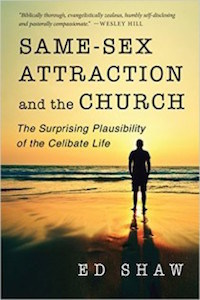 The Plausibility Problem: The Church and Same-Sex Attraction by Ed Shaw. There may be no societal issue more pressing and prevalent today than the issue of homosexuality. What does the Bible say about homosexuality? What is the church to do with those who experience same-sex attraction? It has been a joy to see many Christians begin to offer compelling responses to the world’s wisdom. Ed Shaw’s is one of the best so far. He helpfully identifies specific concerns and shows how the Bible calls us to meet them in God’s way, and he does all of this with a firm grounding in Scripture and without an ounce of compromise. (Buy It | Read My Review)
The Plausibility Problem: The Church and Same-Sex Attraction by Ed Shaw. There may be no societal issue more pressing and prevalent today than the issue of homosexuality. What does the Bible say about homosexuality? What is the church to do with those who experience same-sex attraction? It has been a joy to see many Christians begin to offer compelling responses to the world’s wisdom. Ed Shaw’s is one of the best so far. He helpfully identifies specific concerns and shows how the Bible calls us to meet them in God’s way, and he does all of this with a firm grounding in Scripture and without an ounce of compromise. (Buy It | Read My Review)
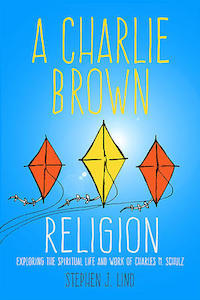 A Charlie Brown Religion: Exploring the Spiritual Life and Work of Charles M. Schulz by Stephen Lind. This fascinating work tells the story of cartoonist Charles Schulz’s life and times while keeping the focus on his faith. His faith was as complicated as the man himself and both developed and diminished over the course of his life. Even while Schulz did so much to generate religious conversation in society, he himself turned further and further from the Bible’s wisdom. This is a fascinating portrayal of a fascinating figure. (Buy It | Read My Review)
A Charlie Brown Religion: Exploring the Spiritual Life and Work of Charles M. Schulz by Stephen Lind. This fascinating work tells the story of cartoonist Charles Schulz’s life and times while keeping the focus on his faith. His faith was as complicated as the man himself and both developed and diminished over the course of his life. Even while Schulz did so much to generate religious conversation in society, he himself turned further and further from the Bible’s wisdom. This is a fascinating portrayal of a fascinating figure. (Buy It | Read My Review)
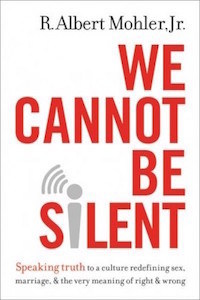 We Cannot Be Silent: Speaking Truth to a Culture Redefining Sex, Marriage, and the Very Meaning of Right and Wrong by Al Mohler. Mohler’s work is both courageous and timely. It closely and critically examines the defining moral issues of our day—sex, gender, and sexuality—and stands firm on the unpopular, traditional, biblical viewpoints. Mohler serves as a trusted guide to many of our deepest, most difficult, and most perplexing questions. The book will equip you to better understand this world and to live as a Christian in it. (Buy It | Read My Review)
We Cannot Be Silent: Speaking Truth to a Culture Redefining Sex, Marriage, and the Very Meaning of Right and Wrong by Al Mohler. Mohler’s work is both courageous and timely. It closely and critically examines the defining moral issues of our day—sex, gender, and sexuality—and stands firm on the unpopular, traditional, biblical viewpoints. Mohler serves as a trusted guide to many of our deepest, most difficult, and most perplexing questions. The book will equip you to better understand this world and to live as a Christian in it. (Buy It | Read My Review)
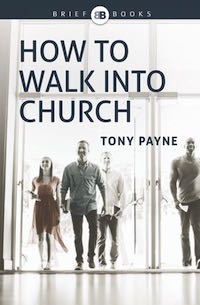 How To Walk Into Church by Tony Payne. I once spent a delightful day with Tony Payne, driving from one end of Sydney to the other and chatting all the while. At that time he told me he was working on this book, and I looked forward to it ever since. This is easily the simplest book on the list. All Payne wants you to do is consider how you walk into church each Sunday. His request is this: Walk into church praying about where you should sit. Yes, it is that simple. And it has that much significance. (Buy It | Read My Review)
How To Walk Into Church by Tony Payne. I once spent a delightful day with Tony Payne, driving from one end of Sydney to the other and chatting all the while. At that time he told me he was working on this book, and I looked forward to it ever since. This is easily the simplest book on the list. All Payne wants you to do is consider how you walk into church each Sunday. His request is this: Walk into church praying about where you should sit. Yes, it is that simple. And it has that much significance. (Buy It | Read My Review)
 The New Pastor’s Handbook: Help and Encouragement for the First Years of Ministry by Jason Helopoulos. This is a book by a young pastor for other young pastors. In forty-eight short chapters Helopoulos provides counsel on knowing and heeding God’s call, on starting out strong in ministry, on the pitfalls young pastors face, and on the joys of ministry. The biggest section is comprised of very practical tips and pointers on a selection of pressing issues: caring for family, reading, leading, busyness, friendship, suffering, and many more. Ultrapractical and stuffed full of timeless wisdom, it will prove valuable to many pastors. (Buy It | Read My Review)
The New Pastor’s Handbook: Help and Encouragement for the First Years of Ministry by Jason Helopoulos. This is a book by a young pastor for other young pastors. In forty-eight short chapters Helopoulos provides counsel on knowing and heeding God’s call, on starting out strong in ministry, on the pitfalls young pastors face, and on the joys of ministry. The biggest section is comprised of very practical tips and pointers on a selection of pressing issues: caring for family, reading, leading, busyness, friendship, suffering, and many more. Ultrapractical and stuffed full of timeless wisdom, it will prove valuable to many pastors. (Buy It | Read My Review)
 The Accidental Feminist: Restoring Our Delight in God’s Good Design by Courtney Reissig. Gender, we are told today, is merely a social construct, untied from sex and unleashed from masculinity or femininity. The clear demarkations of days gone by have been replaced by endless shades of gray. The Bible describes something very different. The Bible describes masculinity and femininity as being distinct, and it describes both of them as reflecting something unique and important about God himself. There is a better way—God’s way. In God’s world distinction exists in order to point to eternal truths, the very subject of Reissig’s excellent book. (Buy It | Read My Review)
The Accidental Feminist: Restoring Our Delight in God’s Good Design by Courtney Reissig. Gender, we are told today, is merely a social construct, untied from sex and unleashed from masculinity or femininity. The clear demarkations of days gone by have been replaced by endless shades of gray. The Bible describes something very different. The Bible describes masculinity and femininity as being distinct, and it describes both of them as reflecting something unique and important about God himself. There is a better way—God’s way. In God’s world distinction exists in order to point to eternal truths, the very subject of Reissig’s excellent book. (Buy It | Read My Review)
 The Compelling Community: Where God’s Power Makes a Church Attractive by Mark Dever & Jamie Dunlop. This book is not a quick-fix or a church-wide program of change. It’s not a how-to guide and not a biographical account of a person or church. Instead, it is “a set of biblical principles that can guide gradual change in your congregation over several years. … It’s a book that attempts to focus on God’s purposes for church community instead of our own. … It’s a modern retelling of truths that have been discussed throughout church history, and especially in the centuries following the Protestant Reformation.” It is not theoretical but practical, drawn right out of the authors’ experiences with their own congregation. (Buy It | Read My Review)
The Compelling Community: Where God’s Power Makes a Church Attractive by Mark Dever & Jamie Dunlop. This book is not a quick-fix or a church-wide program of change. It’s not a how-to guide and not a biographical account of a person or church. Instead, it is “a set of biblical principles that can guide gradual change in your congregation over several years. … It’s a book that attempts to focus on God’s purposes for church community instead of our own. … It’s a modern retelling of truths that have been discussed throughout church history, and especially in the centuries following the Protestant Reformation.” It is not theoretical but practical, drawn right out of the authors’ experiences with their own congregation. (Buy It | Read My Review)
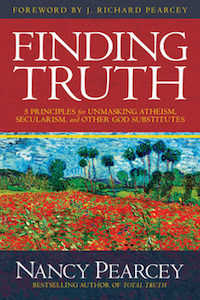 Finding Truth: 5 Principles for Unmasking Atheism, Secularism, and Other God Substitutes by Nancy Pearcey. In this follow-up to Total Truth, Pearcey offers 5 principles meant to unmask our culture’s endless worldview alternatives to Christianity—secularism, atheism, and the like. There are all kinds of books that make a similar promise, but this one has a noteworthy difference: Pearcey looks to Romans 1 to find a kind of apologetics training manual for identifying and challenging any other worldview. Pearcey promises that the principles she lays out will “provide you with the tools to recognize what’s right and wrong with any worldview—and then to craft a biblically informed perspective that is both true and humane.” She makes the promise and she delivers on it. (Buy It | Read My Review)
Finding Truth: 5 Principles for Unmasking Atheism, Secularism, and Other God Substitutes by Nancy Pearcey. In this follow-up to Total Truth, Pearcey offers 5 principles meant to unmask our culture’s endless worldview alternatives to Christianity—secularism, atheism, and the like. There are all kinds of books that make a similar promise, but this one has a noteworthy difference: Pearcey looks to Romans 1 to find a kind of apologetics training manual for identifying and challenging any other worldview. Pearcey promises that the principles she lays out will “provide you with the tools to recognize what’s right and wrong with any worldview—and then to craft a biblically informed perspective that is both true and humane.” She makes the promise and she delivers on it. (Buy It | Read My Review)
 Becoming Worldly Saints: Can You Serve Jesus and Still Enjoy Your Life? by Michael Wittmer. In this book Michael Wittmer answers common questions like these: Can you serve Jesus and still enjoy your life? Is it possible for you to be fully committed to the Lord and still find time to enjoy life’s pleasures? Or, as some seem to feel, do we need to live lives of utter frugality, sending all our money to the mission field? Are we responsible to share the gospel with absolutely every person we encounter? Should we really feel that constant low-grade guilt that accuses us that we are not doing enough for the Lord? In short, how do we resolve the tension between the pleasures of earth and the purpose of heaven? His answers are as compelling as any I’ve read. This book is a life-changer. (Buy It | Read My Review)
Becoming Worldly Saints: Can You Serve Jesus and Still Enjoy Your Life? by Michael Wittmer. In this book Michael Wittmer answers common questions like these: Can you serve Jesus and still enjoy your life? Is it possible for you to be fully committed to the Lord and still find time to enjoy life’s pleasures? Or, as some seem to feel, do we need to live lives of utter frugality, sending all our money to the mission field? Are we responsible to share the gospel with absolutely every person we encounter? Should we really feel that constant low-grade guilt that accuses us that we are not doing enough for the Lord? In short, how do we resolve the tension between the pleasures of earth and the purpose of heaven? His answers are as compelling as any I’ve read. This book is a life-changer. (Buy It | Read My Review)
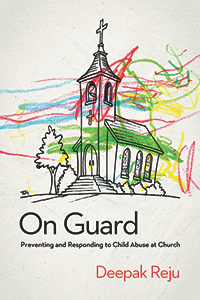 On Guard: Preventing and Responding to Child Abuse at Church by Deepak Reju. I wish this book didn’t exist. At least, I wish it didn’t have to exist. But in a world where abuse is rampant even within churches, this could be one of the most important books you will ever read. If I could mandate that at least one leader from every church had to read a single book, I don’t think there are too many I would choose ahead of this one. Reju carefully shows the danger of abuse and lays out steps to identify and protect against it. “Protecting the children under your care is a way to preserve your gospel witness in your community.” Not only that, but “Our ethical and moral responsibility as Christians is to protect the children whom God has entrusted to us.” We all need to take this very seriously. (Buy It | Read My Review)
On Guard: Preventing and Responding to Child Abuse at Church by Deepak Reju. I wish this book didn’t exist. At least, I wish it didn’t have to exist. But in a world where abuse is rampant even within churches, this could be one of the most important books you will ever read. If I could mandate that at least one leader from every church had to read a single book, I don’t think there are too many I would choose ahead of this one. Reju carefully shows the danger of abuse and lays out steps to identify and protect against it. “Protecting the children under your care is a way to preserve your gospel witness in your community.” Not only that, but “Our ethical and moral responsibility as Christians is to protect the children whom God has entrusted to us.” We all need to take this very seriously. (Buy It | Read My Review)
 A couple of months ago I made the decision to remove the comment section on my blog. I did so largely because comments can only succeed where there is good moderation, and I was increasingly unable to provide that. In lieu of comments I have decided to accept (and encourage) letters to the editor. Today I share some of the letters to the editor that have come in this week—letters that are representative of the ones I received this week. I would invite those of you who read the blog regularly to consider reading these letters as a part of the back-and-forth between writer and readers. Comments on A Quiz on the Doctrine of Scripture I got 32 out of 33, and the one I got wrong was about the overarching message of the Bible [“The overarching goal of the Bible is to bring readers into a saving relationship with God through faith in Christ Jesus.”]. The Shorter Catechism teaches that the chief end of man is to glorify God and to enjoy Him forever, so I would contend that that is the message, and that it includes our salvation via the Cross, and that Christ is the central Character but that the goal and message is that God would be glorified; it is our preparation for Eternity where we will live constantly glorifying Him, for Who He is and for what He has done. —Michael M, Christchurch, New Zealand Really liked the quiz. It was a good mix of true and false, had some…]]>
A couple of months ago I made the decision to remove the comment section on my blog. I did so largely because comments can only succeed where there is good moderation, and I was increasingly unable to provide that. In lieu of comments I have decided to accept (and encourage) letters to the editor. Today I share some of the letters to the editor that have come in this week—letters that are representative of the ones I received this week. I would invite those of you who read the blog regularly to consider reading these letters as a part of the back-and-forth between writer and readers. Comments on A Quiz on the Doctrine of Scripture I got 32 out of 33, and the one I got wrong was about the overarching message of the Bible [“The overarching goal of the Bible is to bring readers into a saving relationship with God through faith in Christ Jesus.”]. The Shorter Catechism teaches that the chief end of man is to glorify God and to enjoy Him forever, so I would contend that that is the message, and that it includes our salvation via the Cross, and that Christ is the central Character but that the goal and message is that God would be glorified; it is our preparation for Eternity where we will live constantly glorifying Him, for Who He is and for what He has done. —Michael M, Christchurch, New Zealand Really liked the quiz. It was a good mix of true and false, had some…]]>
A couple of months ago I made the decision to remove the comment section on my blog. I did so largely because comments can only succeed where there is good moderation, and I was increasingly unable to provide that. In lieu of comments I have decided to accept (and encourage) letters to the editor. Today I share some of the letters to the editor that have come in this week—letters that are representative of the ones I received this week. I would invite those of you who read the blog regularly to consider reading these letters as a part of the back-and-forth between writer and readers.
Comments on A Quiz on the Doctrine of Scripture
I got 32 out of 33, and the one I got wrong was about the overarching message of the Bible [“The overarching goal of the Bible is to bring readers into a saving relationship with God through faith in Christ Jesus.”]. The Shorter Catechism teaches that the chief end of man is to glorify God and to enjoy Him forever, so I would contend that that is the message, and that it includes our salvation via the Cross, and that Christ is the central Character but that the goal and message is that God would be glorified; it is our preparation for Eternity where we will live constantly glorifying Him, for Who He is and for what He has done.
—Michael M, Christchurch, New Zealand
Really liked the quiz. It was a good mix of true and false, had some good depth, and the Scripture and WCF support passages were helpful. The only question that I think is wrong is #32. The answer in the quiz made it man-centered rather than Christ-centered. While the Scripture passages given state the purposes of those particular books as convincing the reader to believe, I don’t think that is the overarching purpose of the Bible. You could look to some of the OT prophets, Isaiah in particular, where God said He was giving His word to harden hearts and most would not hear and believe. Jesus said that He spoke in parables to keep some (Pharisees) from hearing and seeing. Ultimately, the Gospel has a dual purpose – to bring salvation and to harden. If you had to go with an overarching purpose, it may be better to say something like it is about revealing God’s covenant faithfulness to His people, whom He created and who fell into sin, fulfilled in the person of Jesus Christ. (I’m sure there is a better worded way of saying this, but I’m doing this off the top of my head.)
—Tom C, Acworth, GA
I wonder about question 32, I think it was, concerning the main purpose of scripture. I don’t think scripture’s main purpose concerns the salvation of people although it is undoubtably important. My take is that the entire biblical story, from beginning to end it about God, and how he will ultimately accomplish his purposes, for his glory, regardless of the sin and failure of people. The scriptures center on God who created the heavens and the earth.
—Loren B, Temple, TXTim: Of all the questions I asked in the quiz on the doctrine of Scripture, #32 was the one that generated the most questions and confusion. And, in retrospect, I see why. I will rewrite it to maintain the intent of the question, but to add clarity.
I really appreciate the quizzes that you have been running lately, especially how you give the rationale/doctrinal basis for each as each question is answered. It is encouraging to me both to see what I have learned in my years of study and to get further motivation to dig even deeper. Thank you so much for all that you do.
—Andrea N, Canton, NYTim: I’m glad they have proven helpful. I have thoroughly enjoyed putting them together and have more in the works!
First, let me say that you have had a profound impact on my Spiritual life over the past few years that I have been following you. Your insights are simple but deep, well stated and I have found them to be Biblically sound. When you challenge my point of view, I study and seek the guidance of the Holy Spirit and usually find a new insight that I have not considered. I enjoyed the quiz on the Doctrine of Scripture and would like a printable copy of the quiz and the answers/Scripture references to use as a reference for a ladies Bible study class that I am in at my church. Thank you for all you do! God Bless!
—Kellye B, Crystal Springs, MSTim: Thanks so much, Kellye. That is very encouraging. And I plan to have downloadable, printable copies available very soon. There is a surprising amount of copying, pasting, and formatting involved.
Comments on Joel Osteen or Fortune Cookie?
Hi Mr. Challies, I’m writing you to say thank you for a really wonderful website that is thought provoking, educational, and adheres to the gospel.This morning, as I was reading through the different articles delivered to my inbox, I happened across the Joel Osteen quiz, and instantly got convicted of something that I harbor within myself, and am seeing on your website. The lampooning of another person as a form of entertainment for a group of people. The issue that convicts me is that does this edify the listener, or reader? Is it an act of love, or will this turn people against another in hate or ridicule? Now, I am well aware of Mr. Osteen’s lack of theology and doctrine, but maybe the times spent discussing him can be in prayer for him? Describing bullet-points of his wrong theology, and the the hopes for the eventual turn of his heart to that of Christ’s?This is just food-for-thought on how we may want to act around others with ideas that are off, and not necessarily in line with that of Christ. We have churches full of them, do we ridicule these people, or do we help teach them? Would it benefit Joel Osteen to come across your website and see ridicule, or a systematic breakdown of where he is wrong, how it can be righted, and knowing that people are praying for him and encouraging him to be doctrinally sound.
—Matthew D, Canyon Country, CA
Where in the bible are we called to mock another’s ministry for furtherance of our own kingdom?
—Brad D, Spokane, WATim: I received a few comments about mocking Joel Osteen through the Joel Osteen or Fortune Cookie quiz. I rarely mock other people, but in this case I consider it well-founded and would compare it to Elijah mocking the priests of Baal: “And at noon Elijah mocked them, saying, “Cry aloud, for he is a god. Either he is musing, or he is relieving himself, or he is on a journey, or perhaps he is asleep and must be awakened” (1 Kings 18:27). This mockery is not done out of spite for Osteen, but out of hatred for the feel-good, unbiblical, soul-destroying false gospel he advocates. The very fact that most people got only 6 or 7 out of 12 on the quiz just proves the feebleness of his message. I hope that the mockery is effective in helping people see this.
I have a bone to pick with you. I woke up the kids by my laughing hysterically while taking your quiz. Please keep up the good work!
—Christopher V, Ypsilanti, MI
Comments on Weekend A La Carte (November 7)
Was it intentional or coincidental that you linked an article about Perry Noble being in favor of women preachers, right about a link to an article about the dangers of celebrity pastors?
—Joel E, Greenville, SCTim: Well, I had planned to link to them both and it seemed serendipitous to put them one after the other.
General Comments
Like the majority of the civilized world, I was extremely blessed by the comments at the end of articles. Would you be able to solicit a pool of dudes you trust to be guest moderators of comments? Then just put the statements “views of the the guest moderators may or may not reflect whatever. I may not agree with them, but I really like them as people.” THEN, someone else could moderate the comments of gold then you could be off the hook and could write us more books.
—Michael F, East Peoria, ILTim: Thanks, Michael. I continue to debate bringing back the comments section.
As an author and reviewer, would you want to be informed by someone who noticed your work being plagiarized? I’ve seen that done blatantly, and was unable to point it out to the one who used your work (no way to reach the individual that I could find.) It was a source I thought you’d probably see and perhaps address yourself, so I decided to leave it alone. Would you want to be informed?
—Chip G, Plano, TXTim: There is a surprising amount of “Christian plagiarism,” whether that is people posting whole books online or people copying blog articles to their own site. In general I do not respond to it except in the case of books. But if you see it consistently, I would be glad to know about it.
Comments on The Most Terrifying Thing God Can Do
Your article has “fleshed” out a thought I’ve been pondering from Rom. 1 for a while. This thought of God giving over, letting go… The analogy that works for me is that He takes the brakes off. The car (my life) then goes unimpeded down the hill, picking up speed, careening off of other lives, & causing greater & greater damage. You hit the nail on the head. Thanks a bunch.
—Jeff J, Columbus, IN
]]>At the age of 13 I was molested in Scouts by a trusted scout dad. That night changed me forever. I immediately started using drugs and alcohol. By the time I’m 15/16, I’m using all drugs. I’m a full-blown alcoholic and drug addict. My soul was ripped from my chest by that attack at scout camp. I took a hostage as we say in A.A. We got married and started a family. In a short period of time, I ripped my wife’s soul from her chest. She was depressed and suicidal. I was a lunatic. In January of 2010, with the aid of a believer I met in an A.A. meeting, I walked into Christ Community Chapel in Hudson, Ohio. I had been sober for 14 years but I was still empty inside. In a short period of time Christ entered my life. That empty cavern inside was now filled. Within a year, my Lord saw fit to reveal many suppressed memories of my attack 3 decades earlier. For the next two years, I relived the horrors of that night. With the aid of my community group, we walked through the healing process. I was told I must forgive my molester, even if he new nothing about it. I learned of my Lord’s tremendous grace and love freely given me, now I must do the same. I found out my attacker had done prison time for similar crimes against kids. I found his address. With the help of my friend, we wrote Mr Smith a letter. I told him what he did to me was forgiven. The actions he did to me ultimately brought me to Christ. I told him if he wanted to accept Christ as I did, that I would help walk with him through it. Mr Smith would be a very old man now and I didn’t know if he would respond or whatever. But, I sent him the letter. I did not hear back from him but I learned so much about the power of the cross and its healing powers. What one man meant for evil, God meant for good.
—Tom S, Sagamore Hills, OHTim: Thanks for sharing your story, Tom. It is encouraging to hear such a powerful testimony to God’s grace.
 Have you ever seen one of those photo collages of a drug addict as she descends deeper and deeper into her addiction? It is startling to see that in just a few short years an addict can be transformed—or perhaps better, deformed—from an attractive, fresh-faced young lady to a hollow-eyed shadow of a human being. Some drugs are so powerful and so devastating that they rot not only the mind and soul but the body as well. The substance that promises such delight actually delivers terrible destruction. I see the horror of sin pictured in the decaying face of the addict. Her drug is both alluring and punishing. It promises joy and delivers bondage. Meth is its own punishment. It takes captive. It rots. It destroys. And in that way it is a particularly vivid illustration of every other sin. I have been working my way back through the book of Romans, and am just now wading through the terrible truths that come at the end of the first chapter. Here Paul explains why and how God’s wrath is a just response to human depravity. As I have read and considered this passage I have been struck anew with the horror of sin. I have been startled again by the way in which God expresses his wrath. What we learn from Romans 1 is that the most terrifying thing God can do in this life is give you over to your sin. We see that God is the one who restrains human evil—he restrains evil…]]>
Have you ever seen one of those photo collages of a drug addict as she descends deeper and deeper into her addiction? It is startling to see that in just a few short years an addict can be transformed—or perhaps better, deformed—from an attractive, fresh-faced young lady to a hollow-eyed shadow of a human being. Some drugs are so powerful and so devastating that they rot not only the mind and soul but the body as well. The substance that promises such delight actually delivers terrible destruction. I see the horror of sin pictured in the decaying face of the addict. Her drug is both alluring and punishing. It promises joy and delivers bondage. Meth is its own punishment. It takes captive. It rots. It destroys. And in that way it is a particularly vivid illustration of every other sin. I have been working my way back through the book of Romans, and am just now wading through the terrible truths that come at the end of the first chapter. Here Paul explains why and how God’s wrath is a just response to human depravity. As I have read and considered this passage I have been struck anew with the horror of sin. I have been startled again by the way in which God expresses his wrath. What we learn from Romans 1 is that the most terrifying thing God can do in this life is give you over to your sin. We see that God is the one who restrains human evil—he restrains evil…]]>
Have you ever seen one of those photo collages of a drug addict as she descends deeper and deeper into her addiction? It is startling to see that in just a few short years an addict can be transformed—or perhaps better, deformed—from an attractive, fresh-faced young lady to a hollow-eyed shadow of a human being. Some drugs are so powerful and so devastating that they rot not only the mind and soul but the body as well. The substance that promises such delight actually delivers terrible destruction.
 I see the horror of sin pictured in the decaying face of the addict. Her drug is both alluring and punishing. It promises joy and delivers bondage. Meth is its own punishment. It takes captive. It rots. It destroys. And in that way it is a particularly vivid illustration of every other sin.
I see the horror of sin pictured in the decaying face of the addict. Her drug is both alluring and punishing. It promises joy and delivers bondage. Meth is its own punishment. It takes captive. It rots. It destroys. And in that way it is a particularly vivid illustration of every other sin.
I have been working my way back through the book of Romans, and am just now wading through the terrible truths that come at the end of the first chapter. Here Paul explains why and how God’s wrath is a just response to human depravity. As I have read and considered this passage I have been struck anew with the horror of sin. I have been startled again by the way in which God expresses his wrath.
What we learn from Romans 1 is that the most terrifying thing God can do in this life is give you over to your sin. We see that God is the one who restrains human evil—he restrains evil in this world and evil within each one of our hearts. But as people continue to rebel and as they continue to pursue their sin, God eventually lessens his restraint, he loosens his grip on the chain that is holding back the great waves of depravity within each human heart. As the rebellion continues, God eventually lets go, giving people their desire, giving them over to their sin.
We speak often of hell and eternal consequences for sin, but perhaps we give too little attention to God’s action against sin in this world and this life. God’s punishment for sin is sin. His punishment is allowing people to experience the life-stealing, soul-rotting consequences of their sin. He expresses his wrath by allowing them the very thing they want. He does this because when they get the thing they want, it only deepens their destruction. In this way, sin is its own punishment. And in all the world I see nothing more terrifying than this: the prospect of God allowing people to experience the full impact and weight of their sinfulness. Nothing is more terrifying than God determining that he will no longer restrain the evil within them.
There is a call here for each one of us to identify sin in our lives and to put it to death. We need to pray that we would have a tender conscience that responds eagerly and immediately to the Spirit speaking through the Word. We need to heed the Holy Spirit as he calls and enables us to do this. We must take care that we do not harden ourselves against his presence lest he give us the very thing we want. How many who were once sure of their salvation were left spinning and doubting when God relaxed his grip and allowed them to sink deeper into that ongoing sin?
There is a call here as we interact with unbelievers as well, and it is a call to compassion. We can be compassionate because we get this glimpse into what God is doing, into how he is expressing his wrath against sinners. This compassion expresses itself in imploring people to turn from their sin, to understand that their sin only deepens their captivity, to understand that their growing desire to sin only proves their bondage. The greatest act of compassion is to tell people of their sinfulness and to point them to the hope of the gospel. It is for them, and for us, the deepest hope and the only hope.
I am now accepting (and encouraging) letters to the editor. This is an experimental feature meant to replace the comments section. If you would like to write a letter to the editor, you can do so here.
]]> One Strategy to Rule Them All Nancy Pearcey shows how to answer skeptics from Romans 1. The article is a brief overview of the heart of her book Finding Truth which I have reviewed here. How Katrina Changed New Orleans TIME has an interesting infographic that displays how Hurricane Katrina changed New Orleans. This Day in 1688: John Bunyan died at the age of 59. Bunyan is remembered in history as author of The Pilgrim’s Progress, one of the most-read books of all-time. The book has been translated into more than 200 languages and, to this point, has never gone out of print. Lazy Writing, Cheap Restoration Whether or not you agree with every part of this review of War Room, I think you will find that much of it resonates. “This is precisely where War Room, like so many Christian films, stumbles. The characters and situation are so thinly drawn that even those of us who believe in the film’s ultimate message have a hard time with the package wrapped around it.” Tragedy and Transforming Truth It sounds like The Purpose Driven Life may be back in the headlines soon. The Grace To You blog is beginning a short series to remind us what the book is about and why many parts of it are concerning. Leading Your Leaders Retreat Kevin DeYoung has some good things to say about leading (and enjoying) a church leaders’ retreat. Preaching, by Tim Keller 9Marks reviews Tim Keller’s newest book Preaching. They offer a handful of measured critiques…]]>
One Strategy to Rule Them All Nancy Pearcey shows how to answer skeptics from Romans 1. The article is a brief overview of the heart of her book Finding Truth which I have reviewed here. How Katrina Changed New Orleans TIME has an interesting infographic that displays how Hurricane Katrina changed New Orleans. This Day in 1688: John Bunyan died at the age of 59. Bunyan is remembered in history as author of The Pilgrim’s Progress, one of the most-read books of all-time. The book has been translated into more than 200 languages and, to this point, has never gone out of print. Lazy Writing, Cheap Restoration Whether or not you agree with every part of this review of War Room, I think you will find that much of it resonates. “This is precisely where War Room, like so many Christian films, stumbles. The characters and situation are so thinly drawn that even those of us who believe in the film’s ultimate message have a hard time with the package wrapped around it.” Tragedy and Transforming Truth It sounds like The Purpose Driven Life may be back in the headlines soon. The Grace To You blog is beginning a short series to remind us what the book is about and why many parts of it are concerning. Leading Your Leaders Retreat Kevin DeYoung has some good things to say about leading (and enjoying) a church leaders’ retreat. Preaching, by Tim Keller 9Marks reviews Tim Keller’s newest book Preaching. They offer a handful of measured critiques…]]>
One Strategy to Rule Them All
Nancy Pearcey shows how to answer skeptics from Romans 1. The article is a brief overview of the heart of her book Finding Truth which I have reviewed here.
How Katrina Changed New Orleans
TIME has an interesting infographic that displays how Hurricane Katrina changed New Orleans.
This Day in 1688: John Bunyan died at the age of 59. Bunyan is remembered in history as author of The Pilgrim’s Progress, one of the most-read books of all-time. The book has been translated into more than 200 languages and, to this point, has never gone out of print.
Lazy Writing, Cheap Restoration
Whether or not you agree with every part of this review of War Room, I think you will find that much of it resonates. “This is precisely where War Room, like so many Christian films, stumbles. The characters and situation are so thinly drawn that even those of us who believe in the film’s ultimate message have a hard time with the package wrapped around it.”
Tragedy and Transforming Truth
It sounds like The Purpose Driven Life may be back in the headlines soon. The Grace To You blog is beginning a short series to remind us what the book is about and why many parts of it are concerning.
Leading Your Leaders Retreat
Kevin DeYoung has some good things to say about leading (and enjoying) a church leaders’ retreat.
Preaching, by Tim Keller
9Marks reviews Tim Keller’s newest book Preaching. They offer a handful of measured critiques but in the end “highly recommend this volume for its clear and convincing exhortations to be more culturally literate in our preaching and teaching ministries.”

]]>We’re to love our children for who they are, not for what we want them to become.
—Alistair Begg
 ]]>
]]>]]>Look, all I can do is tell the truth. All I can do is speak the truth. I can’t take care of the results. I can’t give life. It’s mysterious, just like to the farmer to us. The only human act is to plant the seed and wait…and wait, go to sleep, it’s all God’s work. First Corinthians 3 says, “God gives the increase.” Life and growth is a divine operation. You must be born from above, John 3. Not of the will of a man…of men, not of the will of flesh, John 1:12, but of God. Listen to it this way, no human being contributes to the regeneration, conversion, justification, salvation process. All we can do is tell the truth. The seed is potent, the gospel is the power of God unto salvation, Romans 1, the soil when prepared by God will receive it and once God makes it grow, I love this part of the little parable, when it begins to grow, it does not stop until it is harvested…first the blade, then the head, then the mature grain in the head and then the harvest. What God begins He completes, right? Philippians 1:6, “Whoever begins a good work in you will perform it until the day of Christ.”
This is a critical lesson, by the way, to all evangelical manipulators and clever marketers who think they can make people believe. No human being no matter how persuasive, no matter how clever, makes a contribution to regeneration, conversion or justification. All we can do is give the truth. We can’t change hearts and we can’t produce life from dead people. That’s something the Lord alone does. “No man comes to me except the Father draws him.” And once He begins to draw him, then it’s the blade, then it’s the ear, then it’s the full grain. It needs to be drummed into the heads and hearts of all Christians who have been seduced by the contemporary lies, that if we just get better at marketing the gospel, we can be more convincing and we can convince people to be saved. Just tell the truth.
I hate to tell you this, music doesn’t have anything to do with it in terms of style. The content of what is said and sung in music may bring the gospel, convey the gospel. But it’s not about mood, it’s not about music, it’s not about invitations, it’s not about any human effort. We don’t do God’s work with human means.







